The Responsible Mobility Governance & Innovation (ReMGo) project pursues an approach that anticipates, evaluates, and addresses potential impacts, societal expectations, and ethical issues relating to research and technology, especially concerning recommendations for action and questions of governance in and outside the Munich Cluster for the Future of Mobility in Metropolitan Regions (MCube). This project is accompanying and integrative to the innovation projects in the cluster and therefore aims at a close exchange with as many actors from science, business, the city, and civil society as possible in the consortium. In the course of this, ReMGo analyzes and reflects political, social, and regulatory aspects in technology, product, and cluster development in specific MCube subprojects as well as across project boundaries.
People (working on the project at the STS Department): Dr. Alexander Wentland, Sophia Knopf
Project leader(s): Dr. Alexander Wentland
Period: 11.2021-11.2023
Project type: Consortium Project
Funding institution: BMBF
Due to heavy investments from governments and private stakeholders, quantum computing technologies have recently entered a level of public awareness and policy attention. This necessitates thorough investigation of the technology’s further development. Our group studies how quantum computing technologies are developed in laboratories, how eco-systems emerge around the purpose of quantum computing innovation and how the topic is received and reacted upon in the public sphere.
People (working on the project at the STS Department): Prof. Dr. Sebastian Pfotenhauer, Dr. Joakim Juhl, Jasmin Shokoui, M.A.,Cecília Peres, M.Sc.
Project leader(s): Prof. Dr. Sebastian Pfotenhauer
Period: 11.2022-11.2025
Funding institution: GoTransTech TUM Innovation Network
The Munich Cluster for the Future of Mobility in Metropolitan Regions (MCube) aims to use the Munich region unique, with its unique geographical concentration of innovation actors in the mobility sector, as a “learning region” to develop scalable solutions for metropolitan regions in Germany and worldwide. We are committed to sustainable, efficient and socially just mobility, with the aim of realizing leap innovations with great economic impact and high solution potential for global challenges.
Project leader(s): Dr. Alexander Wentland
Period:11.2021-11.2024
Project type: Consortium Project
Funding institution: BMBF
The project zooms in on different ways the prevalent “innovation imperative” for regions (Pfotenhauer et al., 2018) and related forces of globalization are being brought into alignment with local identities, culture, history, and politics. The sub-project Cultivating Creativity in Urban Development Projects investigates creative districts as spaces where local understandings of worthwhile innovations are negotiated. Through these different lenses, Understanding Regional Innovation Cultures 2.0 at its core examines development strategies employed to build desirable futures for their citizens in the face of policy expectations to connect these futures to innovation.
“Lost” regions of Innovation
This project explores “lost” regions of innovation, or places shaped by industrial decline, political polarization, and growing disillusionment about the promises of innovation to deliver growth and better living for all citizens. Lost regions are facing mounting pressures to revitalize and redevelop, with the expectation from policymakers that their transformation be linked to innovation. The microchip industry has recently been framed as a high-tech solution to post-industrial places, especially through the US CHIPs and Science Act, a policy that promises to bring semiconductor manufacturing “back” to America and redevelop rustbelt regions through providing jobs, national relevance, and essentially, a future. More specifically, through case studies in Upstate New York (USA), Columbus, Ohio (USA), Leuven (Belgium), and Dresden (Germany), this project examines how innovation is imagined as well as how semiconductor policy is taken up in both rustbelt regions and regions they are trying to emulate. The cases examine how desirable futures are constructed, how they tie into innovation, and how this innovation imaginary travels through different socio-cultural-political landscapes.
“Hidden” regions of Innovation
The research project Hidden Regions: Exploring Innovation in the Periphery examines how regions outside the well-known metropolitan regions and innovation centers are dealing with the pressure to position themselves as innovation leaders and how their future is increasingly linked to their perceived innovation and competitiveness in the eyes of policy makers. A focus here is on economically strong medium-sized urban areas with relative prosperity, characterized by Hidden Champion industries as well as solid social and institutional cohesion. In particular, the project explores how global innovation dynamics shape and are shaped by cultural, socioeconomic, historical, and political contexts at the local level. Within the first project phase, this question is investigated in the context of the region Heilbronn-Franconia. For this purpose, central actors from the fields of economics, research, education, administration, and politics are interviewed to analyze their perspectives on regional innovation cultures. In the second phase of the project, these results are used for a comparison with Ostwestfalen-Lippe and Emilia-Romagna. The results of the study are intended to illustrate the local embeddedness of innovation dynamics to highlight the importance of regional specificities at the crossroad with governed processes of urban transformation.
Cultivating Creativity in Urban Development Projects
Creative districts or cultural districts have become a governmental strategy for battling with local challenges – be it imagining a more ecological and socially equitable urban infrastructure or an economic revival – creativity has become a staple for urban development. Here, Richard Florida’s idea of the “creative class” (2011) still shapes current hopes to synergistically bring together technological innovation, start-ups scenes and a more grounded scene, routed in subculture, arts, and protest movements. Against the background of supra-national developments such as the Green New Deal and the New European Bauhaus Movement, creative districts have become a popular approach to imagine more democratic, inclusive, and sustainable urban futures, whereby respective understandings of worthwhile innovations and social order are (spatially) negotiated. Through extensive case studies on creative districts and creativity-based development strategies in Munich (Germany) and Bristol (UK), the project investigates the local-specific approaches to creativity-based urban transformation: How does the respective state-logic correlate with said approaches? Who is (not) part of the “creative scenes”, and which ideas of creativity, (sub-)culture, and innovation are circulating here? And what does this mean for the respective future of the city?
Project leader(s): Prof. Dr. Sebastian Pfotenhauer
Project type: Third-party funded Project
Funding institution:DFG
What makes expert knowledge credible, legitimate, and reliable for use in public policy? Together with colleagues from TUM and the Helmholtz Centre for Environmental Research (UFZ), Prof. Sebastian Pfotenhauer analyzed Germany’s political pandemic response as part of a larger comparative study organized by Harvard, Cornell, and Columbia universities and funded by the National Science Foundation and Schmidt Futures.
Project leader(s): Prof. Dr. Sebastian Pfotenhauer
Period: 01.03.2020-31.12.2023
Funding institution: National Science Foundation, Schmidt Futures
How can citizens shape the development of healthy and sustainable food, and what role should technology play in this process? What methods can engage publics on diverse issues across food, health and sustainability? How do innovation practices promote or prevent the democratization of food systems and address what are seen as major challenges?
Vertical farming is a technologically-enhanced approach to horticulture that has been widely invested with promises and predictions of producing healthy and sustainable food in close proximity to where people live. New technologies often invoke societal concerns, and vertical farming is no exception having been the subject of divergent claims and criticisms.
This project aims to gain a better understanding of hopes and uncertainties around vertical farming among producers, consumers, scientists, civil society groups and wider publics. It will do so by developing a Citizen Participation Forum (CPF) assessing the potential of vertical farming technologies to address some of the major challenges current food systems face. Combining a range of participation methods including online issue mapping, face-to-face dialogue and hands-on ‘makerthons,’ the CPF aims to stimulate broad public engagement with vertical farming technologies and practices.
“Cultivating Engagement” is a research-driven project that involves collaboration between university, industry and NPO partners, and is funded through EIT Food, the newest EIT – KIC (European Institute of Innovation and Technology – Knowledge and Innovation Community). Besides contributing to scholarship on public engagement in (food & agricultural) science and technology, findings will inform business partners and scientists in other EIT Food projects to critically engage in creating, implementing, and learning from public engagement schemes.
Project results :
- Waller, L. & M. Gugganig (2021). Re-visioning public engagement with emerging technology: A digital methods experiment on ‘vertical farming.’ Public Understanding of Science.
- Deliverable Report 7: Analysis and Outcome of the Project: DEL07(1)
- Deliverable 4, Part 1: Comparative study on citizen engagement with vertical farming between Munich and London: DEL04 Part 1
- Interview TUM Faszination Forschung – “Vertical farming is a child of the Silicon Valley high-tech world”
Partner
Project leader(s): Dr. Mascha Gugganig
Period: 09.2017 - 12.2018
Project type: ["Verbundprojekt \/ Consortium Project"]
Funding institution: EIT Food
This project aims to explore how transnational European research infrastructures have been both a vehicle for, and the beneficiaries of, European integration project. By studying how different generations of European research infrastructures embody different visions and models for European integration, we demonstrate how trans-national science and trans-national European sociopolitical orders have been co-produced with one another.
Project leader(s): Prof. Dr. S. Pfotenhauer
Period: 01.01.2019 – 01.06.2023
Project type: ["Drittmittelprojekt \/ Third-party funded Project"]
Funding institution: DFG
A comparison of five German urban regions and their adoption of best practice models of innovation
.
What is the study about?
The project aims to place questions of local cultures, identities, and social needs at the center of innovation theory. A three-year comparative analysis of five different German urban regions – Berlin, Dortmund, Dresden, Karlsruhe and Munich, – explores how these regions navigate the tensions between abstract models of innovation and local socio-cultural embeddedness. This study aims to understand how each region demonstrates the purpose, mechanics, and limits of innovation differently.
All five city-regions stand out for their strong technical universities and recent initiatives to promote science and technology. Yet, beyond the usual indicators of innovativeness, we seek to understand sociologically how each city-region takes a distinct path to situate itself, along with its changing economy, history, and cultural diversity, in the “innovation society.”
As a result of the project, the concept of regional cultures of innovation will be developed, allowing local differences to be better reflected and accounted for in both innovation theory and public policy.
Why is this topic important?
It is virtually impossible to talk about economic development or societal progress without explicitly or implicitly addressing the need for innovation. Innovation is presented as an important driver of competitiveness and long-term prosperity. It is seen as an essential prerequisite for a better future and a solution to new and persistent challenges – whether in health, demographic change, sustainability, food, poverty, inequality, education, or transportation – almost regardless of where or what the specific challenges are.
Yet more than ever, rifts are also opening up when it comes to shaping innovation and the distribution of its benefits. Although innovation policy has become increasingly scientified and institutionalized, promises by science and technology initiatives to actually boost regions and cities nevertheless regularly fail. The geography of Germany’s declared high-tech hubs remains uneven, dominated by a select few research-rich and affluent urban region.
Popular models of successful innovation, such as the formation of clusters in the sense of Silicon Valley or the coupling of technical universities with the start-up scene, analogous to the U.S. MIT model, and the plans to reproduce this in new places, are reaching their limits in many places.
In connection with this, the innovation research itself also faces many unresolved questions: how can local, social, and cultural factors be seriously incorporated into theory building? How can social science research on innovation help policymakers as well as the public shape innovation initiatives in culturally appropriate and socially robust ways?
Project leader(s): Prof. Dr. S. Pfotenhauer, Dr. A. Wentland
Period: 04.2018 – 04.2021
Project type: ["Drittmittelprojekt \/ Third-party funded Project"]
Funding institution: DFG
“Digitization… what?” Often this is the first reaction of farmers who practice regenerative or biodiverse farming when asked whether they use digital technologies on their farm. GPS-controlled tractors, drones, or the Internet of Things are rarely a lived reality. For others the question may arise in daily work how certain tasks could be simplified.
This subproject explores the possibilities and limits of digitization in small and medium-sized regenerative / biodiverse farming. It poses whether digital technologies with its premise of standardization and automation are fundamentally opposed to biodiverse farming approaches. Are digital technologies fundamentally useless because standardization and automation are not compatible with biodiverse approaches, and if so, how? Which digital technologies and tools already exist for small-scale and/or biodiverse farming, and which ones are still in need of development? Isn’t the cell phone in the farming field also a digital tool? And what about the ownership, protection and monitoring of data collected from these forms of agriculture?
Together with Dr. Sarah Hackfort and her research team at the Department of Agricultural and Food Policy at Humboldt University, and in relation to our Canadian sister project “Diversity by Design,” we explore these questions through an online survey, and a participatory workshop with farmers, and representatives from technology development, design, and policy. Among others, the aim is to develop policy recommendations to strengthen smallholder farms and their specific needs.
Impressions of the workshop “Biodiverse agriculture and digitalization – between contradictions and synergies”
On October 14, 2023, we came together in the beautiful spaxes of ZIRKA, the Center for Interdisciplinary Spatial and Cultural Work, in Munich for a participatory workshop with practitioners from agriculture and gardening across Germany. The focus of the participatory design workshop was on whether, how and which synergies and contradictions exist between biodiverse agriculture and digitalization for small/medium-scale, regenerative and (agro)organic farms.
The 12 participants were invited to approach this topic by formulating visions of the future of agriculture and by using the speculative design approach. In order to better define the areas of work, as workshop team we expanded upon the graphic by Prause and Egger (2023) as a guide, and a selection of working areas formed the basis of the small group work (administration, direct marketing, knowledge transfer and everyday topics; Fig. 1.).[1]
In the first round, the four groups started off by create a mind map to reflect on what solutions are needed for sustainable agriculture. In the second step, the mind map was expanded to include the role of digitalization as part of possible solutions. This was an important sequence, as problems were defined first, and only then the role of digital technologies, which were understood as possible part of the solutions (Fig. 2.).
The next task was then more practical: based on their mind maps, the small groups were asked to specify what innovation would be needed in their specific farm work in 2035 to subsequently design it in a speculative way. Speculative design is a participatory method in which design is understood not (only) as a classically designed solution but as a critique of current realities of life. Here, ‘innovation’ becomes a provocation, and design functions not so much for production but for social debate.[2] In this practical activity, workshop participants therefore designed innovations that also functioned as a critique of prevailing knowledge, administrative, work and social structures in contemporary agriculture.
For example, one group that dealt with administration developed a so-called ‘data pool’ that would be owned by farmers and thus included not only agricultural data but also the very data infrastructure (Fig. 3.). Another group (on direct marketing) envisioned a rural community in which local politicians bear greater responsibility for providing public spaces for direct marketing, and with it, more opportunities for networking and consumer education (Fig. 4.).
Consumer education was also the focus of the third group on knowledge transfer, whose participants here saw an important role for digital information and communication technologies (Fig. 5.). The last group (daily themes and issues) was then dedicated to digital technologies for small-scale agroforestry systems, analysis and automation (e.g., drones), in which, crucially, humans always remain at the center as developers and controllers (Fig. 6.).
The workshop was a great success that was in large part due to the active engagement of the participants (and the sufficient amount of good food!), and we thank everyone for their time! We take away important insights for another workshop in Northern Germany soon, and look forward to presenting the analyzed data soon.
[1] Prause, L. und A. Egger (2023). “Digitalisation for a socio-ecological transformation in Agriculture.” In Jankowski, P., Höfner, A., Hoffmann, M. L., Rohde, F., Rehak, R. & Graf, J. (Eds.). Shaping Digital Transformation for a Sustainable Society. Contributions from Bits & Bäume, 104-109. Along their technology criteria we defined 1) planning, 2) administration, 3) direct marketing, 4) consultancy/recommendatioins for farming praxis, 5) daily themes and issues, 6) excessive production, and 7) knowledge dissemination.
[2] Anthony Dunne and Fiona Raby’s Speculative everything: design, fiction, and social dreaming (2013, MIT Press); Carl DiSalvo Design as democratic inquiry: putting experimental civics into practice (2022, MIT Press).
Project leader(s): Dr. Mascha Gugganig
Funding institution: DFG
How can citizens shape the development of healthy and sustainable food, and what role should technology play in this process? What methods can engage publics on diverse issues across food, health and sustainability? How do innovation practices promote or prevent the democratization of food systems and address what are seen as major challenges?
Vertical farming is a technologically-enhanced approach to horticulture that has been widely invested with promises and predictions of producing healthy and sustainable food in close proximity to where people live. New technologies often invoke societal concerns, and vertical farming is no exception having been the subject of divergent claims and criticisms.
This project aims to gain a better understanding of hopes and uncertainties around vertical farming among producers, consumers, scientists, civil society groups and wider publics. It will do so by developing a Citizen Participation Forum (CPF) assessing the potential of vertical farming technologies to address some of the major challenges current food systems face. Combining a range of participation methods including online issue mapping, face-to-face dialogue and hands-on ‘makerthons,’ the CPF aims to stimulate broad public engagement with vertical farming technologies and practices.
“Cultivating Engagement” is a research-driven project that involves collaboration between university, industry and NPO partners, and is funded through EIT Food, the newest EIT – KIC (European Institute of Innovation and Technology – Knowledge and Innovation Community). Besides contributing to scholarship on public engagement in (food & agricultural) science and technology, findings will inform business partners and scientists in other EIT Food projects to critically engage in creating, implementing, and learning from public engagement schemes.
Project results :
- Waller, L. & M. Gugganig (2021). Re-visioning public engagement with emerging technology: A digital methods experiment on ‘vertical farming.’ Public Understanding of Science.
- Deliverable Report 7: Analysis and Outcome of the Project: DEL07(1)
- Deliverable 4, Part 1: Comparative study on citizen engagement with vertical farming between Munich and London: DEL04 Part 1
- Interview TUM Faszination Forschung – “Vertical farming is a child of the Silicon Valley high-tech world”
Partner
Project leader(s): Dr. Mascha Gugganig
Period: 09.2017 - 12.2018
Project type: ["Verbundprojekt \/ Consortium Project"]
Funding institution: EIT Food
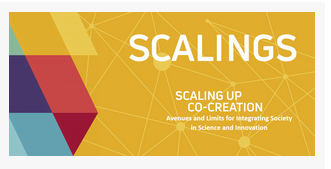
Co-creation—the practice of bringing together diverse actors in a joint innovation activity to mutual benefit— has emerged as a widely desired key resource in current attempts to enhance innovation processes and outcomes. The European Research Consortium SCALINGS explores the avenues and limits for the wider dissemination and use of co-creation practices across Europe.
Through a multi-sited, embedded, and comparative experimental research design, SCALINGS studies the unique implementations and outcomes of three co-creation instruments: innovation procurement, living labs, and co-creation facilities. The consortium focuses on two technology domains (robotics and urban energy systems) across 10 partner countries. SCALINGS aims to strengthen opportunities for best practice transfer and a socially robust upscaling of co-creation, while improving our understanding of how co-creation practices relate to the social, cultural, economic, and institutional environments in which they are implemented. SCALINGS is an interdisciplinary project that brings together social scientists, engineers, policy-makers, and industry partners from all over Europe.
The project SCALINGS is funded by the European Union’s Horizon 2020 research and innovation programme within the specific objective Science with and for Society of Horizon 2020. This objective is to build effective cooperation between science and society, to recruit new talent for science and to pair scientific excellence with social awareness and responsibility.
Partner
- TUM (DE) – Technical University of Munich
- TU/e (NL) – Eindhoven University of Technology
- DTU (DK) – Technical University of Denmark
- EPFL (CH) – École Polytechnique Fédérale de Lausanne
- ARMINES/MINES ParisTech (FR) – Association pour la Recherche et le Développement des Méthodes et Processus Industriels / École Nationale Supérieure des Mines de Paris
- ESADE (ES) – Fundación ESADE
- BOKU (AT) – Universität für Bodenkultur Wien
- UEW (PL) – Wrocław University of Economics
- UCL (UK) – University College London
- SIX (UK) – Social Innovation Exchange Ltd
Project leader(s): Prof. Sebastian Pfotenhauer
Period:09.2018 – 09.2021
Project type: ["consortium"]
Funding institution: Horizon 2020
Are we facing a constitutional crisis? As stem cell research redefines the meaning of life, big data systems subvert expectations of privacy, and nudge economics takes on the role of governments and regulation, science and technology (S&T) play an increasingly profound role in ordering our world. In doing so, they are not only ‘constitutive’ of life in contemporary societies, but indeed ‘constitutional’ – challenging both the existing social orders enshrined in our legal and political institutions and what comes to be regarded as desirable orders in the first place. This poses a number of critical questions at the intersection of science & technology studies (MCTS), law, and public policy: how to think about the constitutional foundations of society in view of recent trends in S&T? What are the implications of these arrangements for understanding rights, responsibilities, subjectivity, government, and regulation? Are conventional approaches to law and democratic governance sufficient to address the challenges of constitutions in a technoscientific world?
This German-American research exchange centered around a joint symposium in Washington DC will explore how science and technology (re-constitute) society through the lens of „technoscientific constitutionalism.“ We build on recent work across a number of domains, including bio-constitutionalism, infrastructure politics, and critical legal studies. As S&T frequently cut to the heart of social, political and legal categories, we propose to study these transformations and their consequences in three paradigmatic domains: biosciences, information technology and economics. Using thus a two-fold comparative approach (across domains and with participants from two countries), the conference will focus allow us to identify salient differences and cultural idiosyncrasies in technoscientific constitutions. We also want to find out how we must change our theories and methods in order to analyze the technoscientific constitutions of contemporary society.
Project leader(s): Prof. Dr. S. Pfotenhauer (TUM), Prof. Dr. Ben Hurlbut (ASU), Prof. Christopher Kelty (UCLA), Prof. Dr. Sabine Maasen (TUM), Prof. Shobita Parthasarathy (University of Michigan), PD Dr. Jan-Hendrik Passoth (TUM), Prof. Malte Ziewitz (Cornell University)
Period: 10/2017 - 07/2029
Project type: Array
Funding institution: DFG - NSF
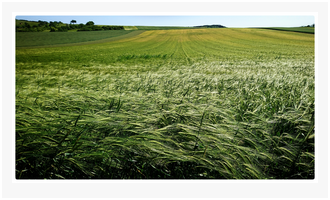
This research project explores discourses and practical applications of innovation, digital technology and “sustainable” agriculture at the EU level and in Germany. Using a multi-sited, ethnographic approach, it examines agricultural practice, policy and debates on contemporary agriculture beyond usual comparisons, such as “high-tech” versus “(s)low / no tech”, and what (pan-)national, societal and political visions are reflected here.
At the EU level, the project examines political debates and implicit visions of innovation and digitization in sustainability targets within the European Green Deal, particularly in the Farm-to-Fork strategy. In Germany, the project focuses on regenerative/agroecological agricultural approaches and the role that innovation and digital technologies play, or ought to play, in these applications. More information about this subproject can be found here.
Project leader(s): Dr. Mascha Gugganig
Period:01.2019 – 12.2023 (pausiert 2021-2022)
Project type: ["Postdoc-Projekt \/ Post Doc Project"]
Funding institution: DFG
At TUM, Akanksha’s PhD research focuses on how the function and role of ‘Rule of Law’ can influence, intervene and guide in setting design goals, choices, and standardizations to configure Distributed Ledger Technologies (DLT) at different layers, keeping in mind its relation with humans and society and how it would impact the historical and social dimension of Rule of Law ecosystem. She employs a theoretical as well as socio-techno-legal approaches to explore the co-existence of DLT (Lex cryptographia ecosystem) and Rule of Law ecosystem and investigate the possibilities of shaping a harmonious Rule of Law-driven development and deployment of DLT. The idea is not merely to set up legal or ethical boundaries for regulatory purpose but to explore an enabling legal framework within which the DLT can thrive as a public good.
Project leader(s): Akanksha Bisoyi
Project type: PhD Project
Today, data protection law has become an important and indispensable prerequisite for activities in organizations. The aim of the project is to train students and researchers at TUM in the confident and socially responsible use of data, by creating a comprehensive asynchronous online course in English, that provides essential legal knowledge on important aspects of data governance. It is not only about data protection, but also about sharing, publishing and making data accessible and the associated handling. In addition to learning about the basic structures of these dynamic regulatory issues, course participants will become familiar with problems they encounter in their daily work. Questions of research data management will be a common thread running through the course. Furthermore, the course contributes to general legal literacy and brings participants closer to the ideal of being able to independently realize Human-Centered Engineering.
Project leader(s): Akanksha Bisoy
The project REMODE develops a participatory risk governance method and toolbox for social media platforms that will enable user autonomy, stimulate good governance, and enforce law and ethics by design. It addresses the general call for more citizen engagement with social media platforms.
Social media platforms shape our experience and reality online: the people we meet, the content we read, the information we receive is all determined by content moderation and recommender systems. These systems and practices can limit the autonomy of the user and expose them to a variety of risks. Contemporary political, social and health crises demonstrate the weaknesses of social media in dealing with fake news and hate speech. Young people on social media can be nudged into self-destructive behavioral patterns by the way content is personalized. Such risks lack the proper involvement of users when they are being assessed.
Recent EU initiatives, such as the Digital Services Act (DSA), impose legal requirements for large social media platforms on the assessment of risks and design of risk mitigation. These platforms should conduct these risk assessments with the participation of the users of these platforms and people impacted by them.
REMODE aims to create a participatory risk governance method and toolbox to enhance and expand citizen engagement. The method will be inspired by both participatory (technology) assessments and participatory design approaches. Close collaboration with all stakeholders is essential for the development, uptake, and integration of the method and toolbox.
What results can be expected?
· A participatory method and toolbox to involve the public in the assessment and design of social media platforms.
· A collection of best practices for the co-design of recommender systems and content moderation practices on social media.
· An overview of possible design solutions relating to risks stemming from social media.
· Multi-stakeholder involvement to guide the development of the method.
This project is led by Daan Herpers and supported by Lisa Mette as student researcher and master thesis student. Prof. Dr. Christian Djeffal is principal investigator.
Project leader(s): Prof. Dr. Christian Djeffal, Daan Herpers MA
Period: 01.07.2022-31.06.2023
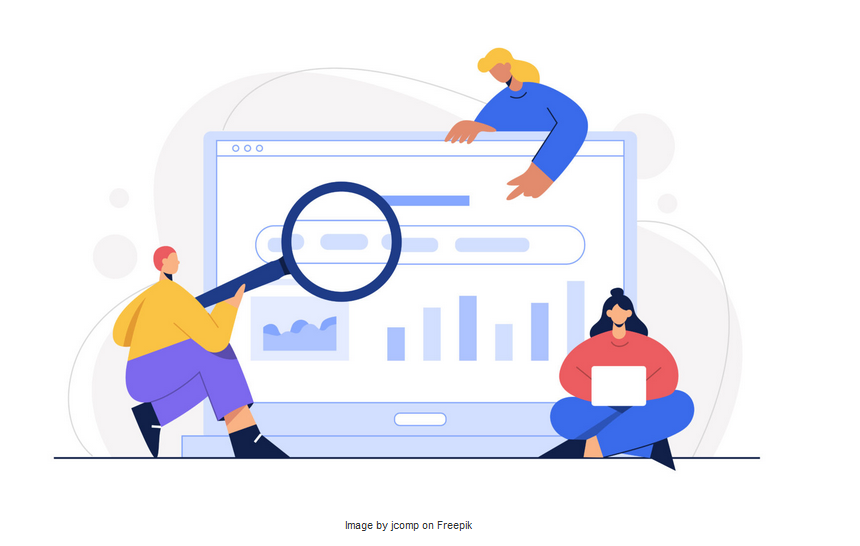
Project leader(s): Prof. Dr. Christian Djeffal, Prof. Dr. Mark Findlay
Period: 01.09.2020 – 01.09.2021
Funding institution: Institute for Ethics in Aritifical Intelligence (IEAI) TUM
Themes: COVID-19; Rule Of Law; Law by design; Critical Design; Privacy Preservation; Contact Tracing, Control Technologies

AI language technologies have a hugely disruptive potential that could provide possibilities for advances in areas that these technologies have not yet permeated. The legal sector is an excellent example in this regard. Recent advances such as new transformers like BERT and GPT3 offer ample prospects for innovation and could help overcoming long known issues such as access to justice. However, neither the requirements for adoption nor the ethical, legal and social implications are sufficiently explored. The project NLawP, a cooperation between the Professorship for Law, Sciences and Technology and the department of Informatics, evaluates how AI technologies can disruptively affect the legal sector. It will produce an overview of current developments and future trends in research and the legal tech market through interchange with key stakeholders in the field.
This project will map state-of-the-art applications and current information about their implications concerning responsible AI. The mapping should result in a better understanding of how specific design choices improve ethical, legal and social aspects. With its multi-perspective approach, the map has the potential to become a central reference point in the debate.
Based on this, the research team will inquire into how data governance can enable a responsible and efficient adoption. The project will allow research into this emerging field of AI with a view to innovation, adoption, responsible uses, and infrastructures. The project will also look into the following steps concerning a sustainable data infrastructure for the legal sector and potential stakeholders’ innovations and imaginaries.
Further informations can be found here.
Project leader(s): Prof. Dr. Christian Djeffal; Prof. Dr. Florian Matthes
Project leader(s): Prof. Dr. Gerog Carle, Prof. Dr. Marc-Oliver Pahl
Period: 01.09.2020 – 01.06.2021
Funding institution: Deutsch-Französische Akademie für die Industrie der Zukunft
Themes: COVID-19; QRONITON; Law by design; Critical Design; Privacy Preservation; Contact Tracing
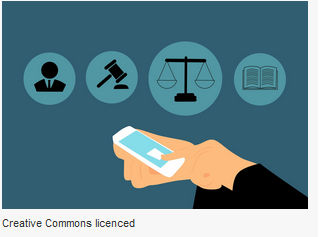
Digitization in highly regulated spaces such as the healthcare sector and legal domain requires interdisciplinary views on legal requirements and technical applications. Artificial Intelligence can be used for the betterment of society, but will also bring about a new dimension to the practice in these fields. ‘Excellence in research and teaching’ requires students that can think outside the traditional boundaries of research cultures. By focusing on bringing students together with different backgrounds, this week will bolster the students’ interactional expertise and help them with questions that exist in this new dimension. It prepares the current and next generation of engineers and social scientists to better understand AI and its implications.
The Plug-in module “Mapping digitization in highly regulated spaces” will allow highly motivated students to analyze digital applications of artificial intelligence in interdisciplinary teams, and to gain in-depth knowledge about the legal frameworks of technology and its social impact. Students from the various departments will focus on state-of-the-art applications from the healthcare industry and legal domain. These fields will be at the center of discussion since they are socially impactful, highly regulated, and are expected to transform heavily with the rise of AI. In line with the strategy of excellence, it allows students to reflect on technical developments in the sense of „Responsible Research and Innovation“ in these fields. Using concrete cases, students learn about legal requirements and regulatory mechanisms as well as technical implementation possibilities. Where the learning moments for engineers will be developed through understanding the ethical implications of the technologies or the legal requirements for implementation, students with a social background will have these moments by understanding how AI functions and what phenomena such as ‘biased AI’ means. By doing so, they gain experience with legally compliant technical designs but also learn to record and share their findings through interesting and impactful outputs. Not only is it important to share the output with fellow students, but also to make it accessible for other groups in society. Through media such as podcasts and videos, students can share their findings in an open-access digital environment.
Project leader(s): Dr. Eduardo Magrani
Period: 01.09.2020 - 31.08.2021
Project type: Plug-in Module
Funding institution: Internal Funding
The project Coding Public Value focuses on the development and evaluation of methods for responsible software engineering for the common good and corresponding institutional, political and organizational frameworks for public-service media platforms. How can legal, political and user-oriented requirements of public media be translated into requirements, methods and quality assessment practices for the engineering of software and which institutional, political, and organizational requirements have to be implemented in order to operate public service media platforms on the foundation of such public service-oriented software engineering? The project combines Science & Technology Studies, Media and Communication Research, Legal Studies, and empirical Software Engineering in an interdisciplinary collaboration.
Project leader(s): Prof. Dr. Christian Djeffal, PD Dr. Jan-Hendrik Passoth, Assoc. Prof. Dr. Daniel Mendez, Prof. Dr. Hans-Bernd Brosius, Prof. Dr. Wolfgang Schulz
Period: 01.01.2020 - 31.03.2023
Project type: Third-party funded Project
Funding institution: bidt
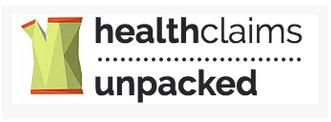
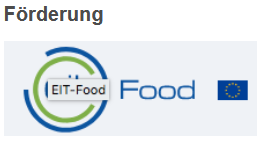
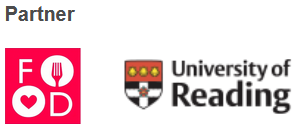
The project develops a digital toolkit (Web App/App) for communicating health claims in cooperation with colleagues from linguistics and and public health organizations. We follow the development ethnographically and develop formats and practices of responsible software design and the participation stakeholders and concerned publics.
Project leader(s): Prof. Dr. Rodney Jones (University of Reading), Jaed Kahn (FoodMaestro), Bridget Benelam (British Nutrition Foundation), Prof. Dr. Christian Djeffal
Period: 01.2020 - 12.2021
Project type: ["Drittmittelprojekt \/ Third-party funded Project"]
Funding institution: EU EIT Food
Motivation
Digital technologies are constantly becoming a bigger part of our everyday life and are shaping our lives and how we live together. Legal advice often plays an important and perhaps still underestimated role when shaping these technologies. The project will shed light on the question whether law can be made fruitful as a design resource.
Goals and approach
The goal is to explore law as a co-productive force and resource for technological design, and to make the use of law and technology cooperative. Therefore, the project develops and improves two intervention approaches aimed at providing legal advice on the design of technology. One intervention addresses the legally compliant design of technology, while the other intervention addresses innovation processes that serve to implement ethical, legal, and social goals. Both interventions are to be developed, tested, reflected upon and improved iteratively, i.e. an effective solution is to be approached step by step. In doing so, the project is in continuous dialogue with the professional public and the general public.
Innovations and perspectives
Through two interventions, creative and original approaches that anchor legal, but also ethical and social aspects in technology development projects, will be tested. These interventions are intended as methods to expand the toolbox of legal technology development consulting.
Project leader(s): Prof. Dr. Christian Djeffal
Period: 31.03.2021-28.02.2024
Funding institution: Federal Ministry of Education and Research
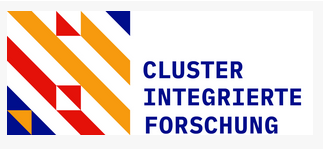
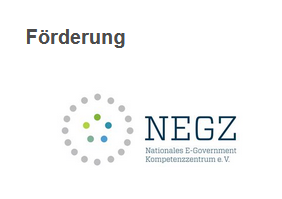
The aim of the project “Artificial Intelligence and Translation in Public Administration” is to explore the potential of AI translation software for public administration. The project will address possibilities, requirements and feasibility according to the state of the art. The quality of automated translations has been raised to a completely new level over the past 10 years. Artificial neural networks develop translation proposals which, although they do not yet come close to human performance, are still used by many translation agencies as source translations.
Project leader(s): Prof. Dr. Christian Djeffal
Period: September 2019 - December 2020
Project type: Third-party funded Project
Funding institution: National E-Government Competence Center
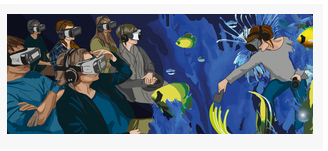
Recently, more and more artists have begun experimenting with the medium of Virtual Reality (VR) and producing immersive, computer generated worlds. Further, festivals and galleries around the world have started exhibiting VR artwork. However, despite this hype around VR art and its very fast and successful entry in the art world, it seems that Virtual Reality is still very nascent and just at the beginning to develop and define its own language, aesthetic, contents etc. and to become a new artistic medium and a new art form. This PhD project investigates how VR is translated into an art medium and an art form. How exactly does VR get established as its own art form? What do the artistic strategies and methods of appropriation of this new and nascent medium look like in detail? How does a new aesthetic language develop? Who is involved in all of these processes? Are there similarities to the strategies and processes of developing and establishing former avant-garde forms as their own art forms? To answer the outlined research questions, a set of different qualitative methods is employed such as document analysis, semi-structured interviews and ethnographic observations of artistic practices in the artist’s studio. By trying to understand the process of translating VR into an artistic medium this project aims to expand different theoretical approaches starting from sociology of art, through research on art in the tradition of Science and Technology Studies (MCTS) to media theories.
Project leader(s): Mariya Dzhimova
Period: Since January 2017
Project type: Promotionsprojekt / PhD Project
Project leader(s): Prof. Dr. Karin Zachmann, Dr. Stefan Esselborn
Period: 01.08.2020 – 01.08.2023
Funding institution: DFG
Themes: technical safety, risk, nuclear power, automobile, FRG, GDR
Since the middle of the 20th century, population movements in the western world have increasingly been dictated and controlled by the individual skills of (potential) migrants rather than their national origins. Skills have not only been considered a condition for entering the country, but also for being able to work in adequate employment positions on the labor market. In order to be able to compare professional résumés acquired in different educational systems or even cultures, western countries have tried since the 1960s to make the skills of migrants measurable. Using the examples of the Federal Republic of Germany, Canada and Great Britain, the study first examines the attempts made in the context of international economic cooperation, to evaluate and compare skills acquired abroad by migrants. Second, there is the question of whether and how knowledge of the skills of migrants has been utilised as a measure to esure that migration does not, or will not, overload the social system.
Project leader(s): Olga Sparschuh
Project type: Postdoc-Projekt / Post Doc Project
The next stage of this long-term project will attempt to synthesise previous research. The aim is to identify and historically understand the characteristics of modern technology, its social functions and its secondary consequences for social, cultural and natural processes in modern societies. To this end, a longer text is currently being drafted, which is intended to offer a historical understanding of modern technology - and modernity as a whole. A first version of the results is now available.
In addition to this larger synthesis project, I am also involved in an acatech working group on issues of technology communication, particularly in the media. In order to understand the political and social dynamics of the controversy surrounding technology and science, a historical media theory is required. That is what I will endeavour to do. At the same time, this is an important building block for the synthesis work mentioned above.
This text is an attempt to make a proposal for understanding the technology of modernity in a short space (approx. 100,000 words). The text is freely available as an e-book and can be redistributed as desired, provided the source is acknowledged. After the previous version 0.9, it is now available for the first time in authoritative form in version 1.0. I look forward to feedback and discussions.
Downloads
Technik der Moderne – Ein Vorschlag zu ihrem Verständnis, Version 1.0 (ca. 300 Seiten, pdf 6,4 MB)
Änderungen und Ergänzungen in Version 1.0 gegenüber Version 0,9 (2 Seiten, pdf 68 KB)
Technik der Moderne – Ein Vorschlag zu ihrem Verständnis, Version 0.9 (ca. 300 Seiten, pdf 6,3 MB
Projektleitung: Ulrich Wengenroth
Evidence is continually growing in importance for political, societal, and individual decisions, despite increasing talk of an impending ‘post-factual era’. Evidence is based on data that is collected in a scientific fashion, but is also a social phenomenon. How and by whom is it created and used, and what impact does this have? These are the main questions that our Research Group has set out to investigate. Since evidence is an issue that concern many different scientific disciplines, our group is interdisciplinary in outlook. Our six sub-projects include scholars from the subject areas History of Technology, Sociology of Science/MCTS, History and Ethics of Medicine, Marketing and Consumer Research, as well as History of Science and Technology.
- Speaker: Prof. Dr. Karin Zachmann
- Co-Speaker: Jun.-Prof. Dr. Sascha Dickel (Sociology of Science, University of Mainz)
- Coordinator: Dr. Olga Sparschuh
Subprojects
subProject 4: The Role of Moralization in the Interpretation and Use of Nutritional Evidence
2020 – 2023
This project examines the evidence practices of consumers in the field of nutrition. Nutrition is an evolutionary and culturally engrained practice that has only recently – approximately the last hundred years – been strengthened, confronted or changed by findings from the nutritional sciences. The results of the first research phase show that evidence – understood as meaningful and socially accepted knowledge and guiding consumer action – is not only based on scientific knowledge, but is influenced by heuristics and values. This is especially the case when scientific knowledge is fragile and in conflict with intuitive judgments of right or wrong and good or bad.
- Prof. Dr. Jutta Roosen
- Edoardo Maria Pelli
subproject 5: The Risk Industry. Evidence for safety as a new field of research and enterprise (1960s to 1980s)
08.2020 – 08.2023
This project investigates changing evidence practices for technical safety in Germany during a key period from the 1950s to the 1980s. Whereas the first project phase focused mainly on the two technological domains of nuclear and automotive technology, the second phase will concentrate on the emergence of what we call the risk industry. We use this term to describe the new field of academic as well as commercial activity arising since the late 1960s, which used the concept of risk as a central category in order to produce and apply knowledge on and evidence for (technical) safety – in an engineering, political-discursive, as well as entrepreneurial sense. The project aims to describe the historical development of this new field of knowledge in the Federal Republic of Germany (FRG) and to analyze its role in the establishment of a new evidence regime for technical safety since the 1970s.
- Prof. Dr. Karin Zachmann
- Dr. Stefan Esselborn
Subproject 8: Obviously Excellent? Evidence practices in preparing scientific research and biographies when applying for ERC starting and consolidator grants
In the contemporary scientific system, high scientific quality – often framed as excellence – has become both a key goal of scientific and political activities and the center of many controversies How, for example, can excellence be defined, measured, compared and made evident? Subproject 8 focuses on evidence practices in the evaluation of scientific quality for research funding purposes
- Prof. Dr. Ruth Müller
- Dr. Mallory James
Project leader(s): Prof. Dr. Karin Zachmann
Period: 13.12.2016 – 30.09.2023
Project type: Verbundprojekt / Consortium Project
Funding institution: DFG
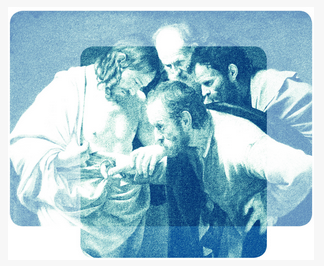
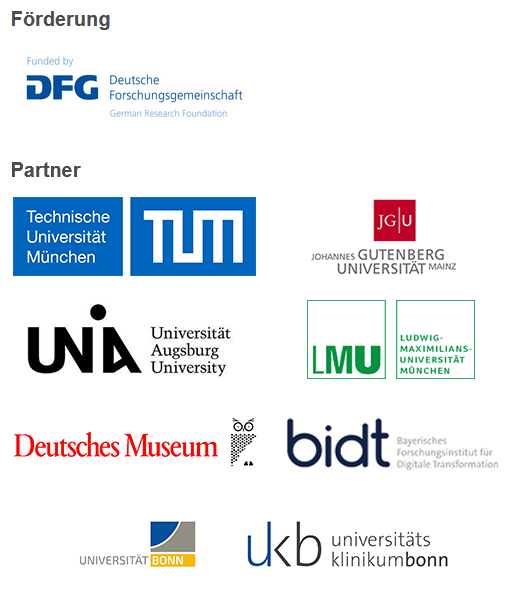
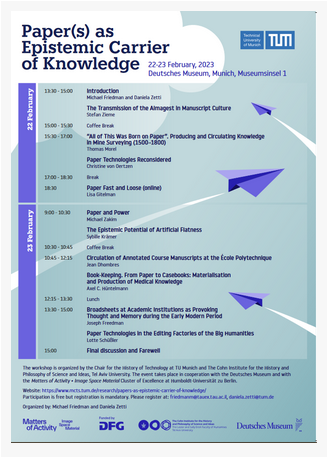
A history of provoking thought and memory
Workshop at Deutsches Museum Munich, Kerschensteiner Kolleg, 22-23 February 2023
Program: please scroll down
Paper has long been seen in our digital century as a disappearing medium. While its continued centrality for note-taking, scribbling, and as a material
basis of expressing thought is recognized in the recent literature, today’s
final products of scientific publication processes – downloadable files and e-books – steadily transform paper’s character as a collaborative and
collective carrier of knowledge. Paper’s epistemic functions are thus individualized and marginalized – functions which were once essential for thinking with and at the same time on paper.
While we can strongly doubt that paper is disappearing from our lives, we should ask all the more how its character is changing, particularly also given how its very material basis is increasingly challenged by media ecological disturbances in its logistic chains. The workshop aims to discuss these issues in a historical perspective – i.e. discuss what it means and meant, to think with and on paper. Here thinking with does not mean necessarily a conception of a scholar, who is alone with his scribbles and a piece of paper, but it means much more thinking about paper as a communal object, which is circulating between authors and readers or between certain communities, collective actors and individuals who do not necessarily belong to the same social groups. One may take as an example the numerous notes, drafts and pieces of paper, which were found in Gottfried Wilhelm Leibniz’ library and Nachlass; those circulated among his colleagues, were copied and restructured, thus prompting new ideas and at the same time changing their function. Paper may be therefore also regarded as the subtract per se of a “trading zone” between groups of actors, as every such encounter between these groups may prompt a reconsideration of paper and what it carries. By thinking on paper we mean not only the concretization of acts of reflection on the paper (in form or writing) but also, that to use papers as epistemic objects implies material, technical, economic, physical and intellectual conditions that, depending on the context, have to be accepted, rejected, or can be changed. The desks of the present, to give another example, are involved in paper based processes of communication, storage, and deletion, and at the same time they are the site of digital processes that are administratively prepared and operated. In this interplay and co-creation of paper and digital media, relationships and collaborations have recently been changing and are challenged, such as those between author and publisher or researcher and archivist.
Summing up: the workshop aims to think on paper as an object of circulations of knowledge and of practices of enabling and transforming collective memory. Paper here should be however considered in plural, not only due to the various functions it had and has, but also since its characterization as an epistemic object. This consideration enables new research questions and marks problems without necessarily supplying answers. This epistemic character also changes over time: when paper was scarce and highly unavailable, every piece of it should have been used; at other times, when it was more abundant, its epistemic character changed, and one may suggest that scribbling, editing and re-editing of manuscripts became more abundant. How are these transformations to be seen in the natural sciences, in the development of technology and in education? How did the character of the paper as an instrument for thinking and memorizing change in history? And can one consider paper as a changing border between materiality (paper) and abstraction (thought)? We thus especially understand paper as a material foundation to human expression, capable of provoking thought.
Daniela Zetti: daniela.zetti@tum.de
Michael Friedman: friedmanm@tauex.tau.ac.il
Program: Paper(s) as Epistemic Carrier of Knowledge
February, 22-23, 2023
Deutsches Museum, Munich, Museumsinsel 1, Kerschensteiner Kolleg
22 February
13:30-15:00
Introduction
Michael Friedman and Daniela Zetti
The Transmission of the Almagest in Manuscript Culture
Stefan Zieme
15:00-15:30 Coffee Break
15:30-17:00
“All of This Was Born on Paper”. Producing and Circulating Knowledge in Mine Surveying (1500–1800)
Thomas Morel
Paper Technologies Reconsidered
Christine von Oertzen
Panel discussion moderated by Laura Niebling
17:00-18:30 Break
18:30
Paper Fast and Loose (online)
Lisa Gitelman
23 February
9:30-9:45
Welcome
9:45-10:30
Paper and Power
Michael Zakim
*cancelled – The Epistemic Potential of Artificial Flatness – cancelled*
Sybille Krämer
Panel discussion moderated by Ellen Harlizius-Klück
10:30-10:45 Break
10:45-12:15
Circulation of Annotated Course Manuscripts at the École Polytechnique
Jean Dhombres
Book-Keeping. From Paper to Casebooks: Materialisation and Production of Medical Knowledge
Axel C. Hüntelmann
Panel discussion moderated by Karin Zachmann
12:15-13:30
Lunch
13:30-15:00
Broadsheets at Academic Institutions as Provoking Thought and Memory during the Early Modern Period
Joseph S. Freedman
Paper Technologies in the Editing Factories of the Big Humanities
Lotte Schüßler
Panel discussion moderated by Felix Mauch
15:00-16:00
Final discussion and farewell
Partner
The workshop is organized by the Chair for the History of Technology at TU Munich and The Cohn Institute for the History and Philosophy of Science and Ideas, Tel Aviv University. The event takes place in cooperation with the Deutsches Museum and with the Matters of Activity • Image Space Material Cluster of Excellence at Humboldt-Universität zu Berlin.
Mail: friedmanm@tauex.tau.ac.il, daniela.zetti@tum.de - participation is free but registration is mandatory.
Please send us an email to register. Thank you!
Biofacts are hybrid objects that, like the cloned sheep and the genetically modified tomato, undermine the traditional distinction between inanimate technology and living nature and thereby cause social conflicts again and again. The current discussions on the application of genetic engineering in the agricultural and food sector are a significant example.
The objective of the research association The Language of Biofacts is to develop, through the example of high-tech plants, a theoretically and empirically sound framework for the analysis and comprehension of biofacts as socio-technical objects in modern societies. In doing so we contribute to a deeper reflection on biofacts as well as a better comprehension of current conflicts in the agricultural and food sector.
As an interdisciplinary alliance of scientists (> people) from history, philosophy, sociology and industrial design, the research association comprises six sub-projects. The scientists are based at the Ludwig Maximilian University Munich, the Technical University Braunschweig and the Technical University Munich. The coordination of the research association is situated at the Technical University Munich.
The sub-projects are supported by a varying body of experts including Dr. habil. Werner L. Kutsch (>ICOS RI), Helsinki; Dr. Martha Mertens, Munich; Dr. Helga Satzinger, London; Dipl. Volksw. Maren Schüpphaus (>ScienceDialogue & >dialogimpulse), Munich, and Prof. Dr. Bettina Wahrig Braunschweig ( >Abt. Wissenschafts- und Pharmaziegeschichte, Technische Universität Braunschweig)as permanent members. The research association receives additional support from its two practice partners the >German Museum and the >KWS SAAT SE.
The research association The Language of Biofacts is promoted by the >Federal Ministry of Education and Research in the context of its initiative >The Language of Objects from the period of 3/2015 until 8/2017. The association is supervised by the >project sponsor in the German Centre for Aviation and Space Travel.
Partner
Subprojects
BIOFACTS OF THE ATOMIC AGE: IRRADIATED ORGANISMS OF THE AGRICULTURAL AND FOOD SECTOR IN PROJECTS OF THE DEVELOPMENT AID
Irradiated organisms such as irradiated potatoes, fruit flies sterilized by radiation or radiation-induced rice mutants primarily result from the application of nuclear technologies in the agricultural and food industry which was fostered in the cold war. Its development started in the inter-war period when researchers examined the effects of radioisotopes and ionizing radiation on living organisms. What started out of curiosity was pushed under the specific conditions of the cold war from the context of the laboratory into the world of industrial application in order to prove the peaceful usability of nuclear technology.(>more)
Project leader(s): Prof. Dr. Karin Zachmann
Period: 01.03.2015 - 31.08.2017
Project type: Consortium Project
Funding institution: BMBF
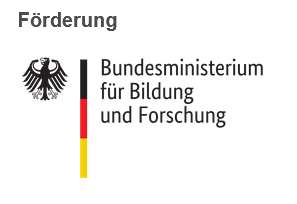
Logistics, both materially and metaphorically, is tied to histories of urbanization. As a managerial rationality and a material practice for reorganizing global space in service of expanding the total circuit of flows, it is fundamentally dependent on cities and their infrastructures to keep the constant movement of flows going. The systems that coordinate the circulation of goods, ideas, and capital into integrated networks—from roads and railways to loading docks, bonded warehouses, and global communications—shape built environments, by creating operational landscapes of connectivity and transmission; designed according to a paradigm of efficiency and control. In all these regards, logistics has been central to Singapore’s urban development during the era of “First Globalizations.” Shaped by its long history of maritime commerce, the Southeast Asian metropolis was held together neither by a single language nor by political integration—although it formed part of the British Empire. Rather, it was defined by mobility and circulation, that is the constant flow of goods, people, knowledge, and commodities: a logistical city integrated by “free” trade and the forces of capital in search of profits on the forest frontiers of the Malay Archipelago. By exploring Singapore’s logistical urbanization between 1848 and 1942, my research aims to critically unpack these relations between the built networks that coordinate the circulation of things, and their effects on the everyday urban experience.
Project leader(s): Dr. Felix Mauch
Period: 01.01.2016 – 31.12.2022
Project type: ["Postdoc-Projekt \/ Post Doc Project"]
Funding institution: TUM
The project aims to analyze practices of evidence concerning technical safety in both German states between the 1950s and the 1980s, using two specific technological fields – automobiles and nuclear power – as case studies. As key technologies of the atomic and the consumer age, both fields have had a substantial part in transforming the idea of safety/security into a societal core value. Making use of the chiasmus “practicing evidence – evidencing practice”, we study discourses as well as concrete practices of technical safety as an increasingly important precondition for the societal acceptance of technology.
Project leader(s): Prof. Dr. Karin Zachmann, Dr. Stefan Esselborn
Period: 01.04.2017 – 31.03.2020
Project type: ["Postdoc-Projekt \/ Post Doc Project"]
Funding institution: DFG
This study addresses the global spread of disease vector control regimes, when the World Health Organisation (WHO) sent scientists and experts to remote areas in Africa, the Americas, and Asia to study and transfer methods of combating insect vectors of diseases in developing countries. In doing so, they attempted to develop a distinctive environmental approach to control vector-borne diseases in the emerging Global South, and to apply this approach across contexts. This study takes as its particular subject of inquiry the circulation of knowledge between malaria and river blindness campaigns and hence the various attempts to control anopheles and black flies by techniques such as large-scale spraying of pesticides, water management and bush clearing. Local contingencies as well as the implementation of environmental protection measures gradually re-casted medical development policies. I investigate this transformation by drawing on processes in decolonizing areas in Africa and underdeveloped areas in the Americas. Tracing what has been called in an imperial context the “selective bricolage” (Ann Stoler) of ideas and practices, I will focus on understudied but fertile spatial, temporal, and epistemological connections and exchanges.
Project leader(s): Dr. Sarah Ehlers
Period:
Project type: ["Postdoc-Projekt \/ Post Doc Project"]
Funding institution: TUM
Situated at the intersection of science and technology studies, communication studies, and critical race studies, my research investigates the public circulation of scientific knowledge about racialization, health inequalities, and environmental contamination. My current research project, “Planning for Persistent Environmental Contamination: Public Health, Indigenous Traditional Knowledge, and Technoscience in Canada,” examines methodologies employed by citizen science projects to gather evidence of environmental contamination in a settler colonial context where this evidence is itself contested. Scientists have long relied upon the labor of “lay” or “amateur” data collectors whose situated knowledge of localities, access to data collection sites, and ability to devote their time and labor have provided context and direction in the production of scientific knowledge. In considering how evidence of harm is produced, I analyze contested practices of measurement and negotiations between First Nations actors, toxicologists, industry, and government policymakers over what counts as evidence.
Project leader(s): Sarah Blacker
Period:
Project type: ["Postdoc-Projekt \/ Post Doc Project"]
Funding institution: TUM
Project leader(s): PD Dr. Jana Heinz
Period: 01.03.2023-28.02.2026
Funding institution: Bundesministerium für Bildung und Forschung (BMBF)
Themes: Leseförderung durch eine in pädagogische Lehr- und Lernsettings eingebettete App und KI-gestützte Spracherkennung
Project leader(s): Dr. Nils Matzner
Period: 01.01.2022-31.12.2024
Funding institution: Bundesministerium für Bildung und Forschung (BMBF)
Themes: Klimawandel; Negative Emissionsn; Carbon Dioxide Removal; Biomasse; Vertrauen in Wissenschaft
For a long time, the participation of laypersons in research was regarded as hardly compatible with the self-image of modern science. However, this is beginning to change. A socio-epistemic arrangement based on the participation of laypersons in the research process is currently establishing itself under the banner of Citizen Science. This leads to the emergence of new functional relationships in which knowledge is co-produced, new forms of worksharing are evolving and established role models become disputable. Digitisation is regarded as the technological driver of current Citizen Science. Citizen Science is associated with science policy expectations of a democratization of science and a participatory coping with social challenges.
The question is how evidence practices function in Citizen Science – in view of the participation of actors who do not belong to certified scientific professional communities. (How) can knowledge be regarded as credible and action-oriented even if the social circle of those involved in research transcends the professional scientific context?
Partner
- Prof. Dr. Sascha Dickel (Uni Mainz)
Project leader(s): Prof. Dr. Sabine Maasen; Prof. Dr. Sascha Dickel (Uni Mainz)
Period: 05/2017 - 04/2020
Project type: Array
Funding institution: DFG
Prototypes are able to make vague but visible statements about future technologies and about how one might possibly interact with them. Moreover, they open up alternatives but are able to direct imaginations along a certain path. For instance, in how far does the design of an autonomous vehicle convey visions of tomorrow’s traffic? Besides, are visions that are materialised through prototypes more likely about to be realised? Against this backdrop, prototypical design can be regarded as a model for contemporary societal learning and innovating.
The sub-project “PROLAB – Living Labs as Prototypical Milieus” focuses on how prototypes within the fields of transport and health are conceptualised by potential users, designers and industrial stakeholders. This raises issues of how learning and innovating take place in so-called living labs: how is this influenced by different participating actors and by digitisation? In turn, it can be asked, what kinds of participation do living labs facilitate? Within the project, designed prototypes will be followed throughout their whole formation process, including, for example, via hackathons. They will ultimately be presented at an exhibition at the Deutsches Museum Nuremberg.
Funded by the Federal Ministry for Education and Research (BMBF) within the funding initiative „Die Sprache der Objekte – Materielle Kultur im Kontext gesellschaftlicher Entwicklungen“
Link to the official website: http://prototyping-futures.org/
Partner
Cooperation partners in the collaborative project: Johannes-Gutenberg Universität Mainz (JGU), Deutsches Museum Nürnberg, Interaction Design Lab at tge University for Applied Sciences Potsdam
Subprojects
Part of the collaborative project „PROTOTYP – Material design of the future. Prototypes as communication media of the new.” (coordinator: Prof. Dr. Sascha Dickel, Johannes-Gutenberg Universität Mainz (JGU)).
Project leader(s): Prof. Dr. Sabine Maasen
Period: 09.2018 – 08.2021
Project type: Third-party funded Project, Consortium Project
Funding institution: BMBF

Moving to Product-Service Systems (PSS) makes it increasingly challenging to coordinate the interaction between an increasingly heterogeneous group of actors. This requires
- innovation work, defined as the social praxis of developing innovations. Such innovation work must be
- periodically evaluated and refined. Finally,
- in a process of institutional reflexivity, the emerging organizational forms of cycle-management must themselves be monitored and adjusted. Sub-project A11 addresses the third level: How can organizational arrangements themselves be cyclically evaluated and refined?
It aims at identifying appropriate forms of institutional reflexivity and develops a participatory approach to co-design them with relevant stakeholders.
Project leader(s): PD Dr. Jan-Hendrik Passoth, Prof. Dr. Sabine Maasen, Tobias Drewlani, Johan Buchholz, Dr. Uli Meyer
Period:
Project type: ["Drittmittelprojekt \/ Third-party funded Project"]
Funding institution: DFG
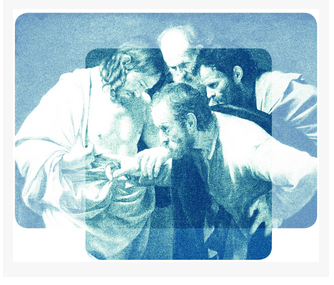
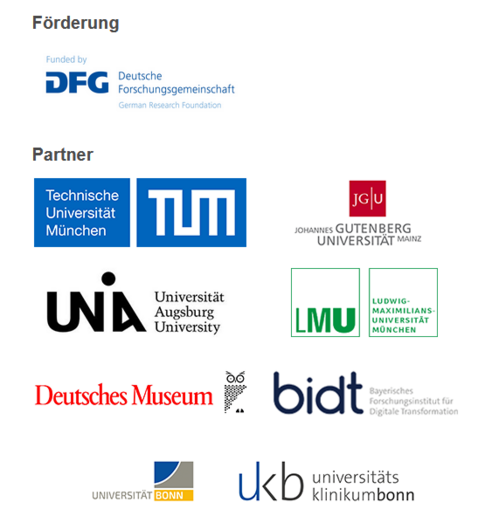
Evidence is continually growing in importance for political, societal, and individual decisions, despite increasing talk of an impending ‘post-factual era’. Evidence is based on data that is collected in a scientific fashion, but is also a social phenomenon. How and by whom is it created and used, and what impact does this have? These are the main questions that our Research Group has set out to investigate. Since evidence is an issue that concern many different scientific disciplines, our group is interdisciplinary in outlook. Our six sub-projects include scholars from the subject areas History of Technology, Sociology of Science/MCTS, History and Ethics of Medicine, Marketing and Consumer Research, as well as History of Science and Technology.
- Speaker: Prof. Dr. Karin Zachmann
- Co-Speaker: Jun.-Prof. Dr. Sascha Dickel (Sociology of Science, University of Mainz)
- Coordinator: Dr. Olga Sparschuh
Subprojects
subProject 4: The Role of Moralization in the Interpretation and Use of Nutritional Evidence
2020 – 2023
This project examines the evidence practices of consumers in the field of nutrition. Nutrition is an evolutionary and culturally engrained practice that has only recently – approximately the last hundred years – been strengthened, confronted or changed by findings from the nutritional sciences. The results of the first research phase show that evidence – understood as meaningful and socially accepted knowledge and guiding consumer action – is not only based on scientific knowledge, but is influenced by heuristics and values. This is especially the case when scientific knowledge is fragile and in conflict with intuitive judgments of right or wrong and good or bad.
- Prof. Dr. Jutta Roosen
- Edoardo Maria Pelli
subproject 5: The Risk Industry. Evidence for safety as a new field of research and enterprise (1960s to 1980s)
08.2020 – 08.2023
This project investigates changing evidence practices for technical safety in Germany during a key period from the 1950s to the 1980s. Whereas the first project phase focused mainly on the two technological domains of nuclear and automotive technology, the second phase will concentrate on the emergence of what we call the risk industry. We use this term to describe the new field of academic as well as commercial activity arising since the late 1960s, which used the concept of risk as a central category in order to produce and apply knowledge on and evidence for (technical) safety – in an engineering, political-discursive, as well as entrepreneurial sense. The project aims to describe the historical development of this new field of knowledge in the Federal Republic of Germany (FRG) and to analyze its role in the establishment of a new evidence regime for technical safety since the 1970s.
- Prof. Dr. Karin Zachmann
- Dr. Stefan Esselborn
Subproject 8: Obviously Excellent? Evidence practices in preparing scientific research and biographies when applying for ERC starting and consolidator grants
In the contemporary scientific system, high scientific quality – often framed as excellence – has become both a key goal of scientific and political activities and the center of many controversies How, for example, can excellence be defined, measured, compared and made evident? Subproject 8 focuses on evidence practices in the evaluation of scientific quality for research funding purposes
- Prof. Dr. Ruth Müller
- Dr. Mallory James
Project leader(s): Prof. Dr. Karin Zachmann
Period: 13.12.2016 – 30.09.2023
Project type: Verbundprojekt / Consortium Project
Funding institution: DFG
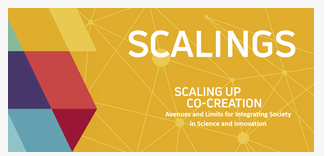
Co-creation—the practice of bringing together diverse actors in a joint innovation activity to mutual benefit— has emerged as a widely desired key resource in current attempts to enhance innovation processes and outcomes. The European Research Consortium SCALINGS explores the avenues and limits for the wider dissemination and use of co-creation practices across Europe.
Through a multi-sited, embedded, and comparative experimental research design, SCALINGS studies the unique implementations and outcomes of three co-creation instruments: innovation procurement, living labs, and co-creation facilities. The consortium focuses on two technology domains (robotics and urban energy systems) across 10 partner countries. SCALINGS aims to strengthen opportunities for best practice transfer and a socially robust upscaling of co-creation, while improving our understanding of how co-creation practices relate to the social, cultural, economic, and institutional environments in which they are implemented. SCALINGS is an interdisciplinary project that brings together social scientists, engineers, policy-makers, and industry partners from all over Europe.
The project SCALINGS is funded by the European Union’s Horizon 2020 research and innovation programme within the specific objective Science with and for Society of Horizon 2020. This objective is to build effective cooperation between science and society, to recruit new talent for science and to pair scientific excellence with social awareness and responsibility.
Partner
- TUM (DE) – Technical University of Munich
- TU/e (NL) – Eindhoven University of Technology
- DTU (DK) – Technical University of Denmark
- EPFL (CH) – École Polytechnique Fédérale de Lausanne
- ARMINES/MINES ParisTech (FR) – Association pour la Recherche et le Développement des Méthodes et Processus Industriels / École Nationale Supérieure des Mines de Paris
- ESADE (ES) – Fundación ESADE
- BOKU (AT) – Universität für Bodenkultur Wien
- UEW (PL) – Wrocław University of Economics
- UCL (UK) – University College London
- SIX (UK) – Social Innovation Exchange Ltd
Project leader(s): Prof. Sebastian Pfotenhauer
Period: 09.2018 – 09.2021
Project type: ["consortium"]
Funding institution: Horizon 2020
The dissertation project focuses on (re)configurations of nature and technology in and of food innovations. By looking at the ever-changing relations of nature and technology, it investigates a currently specific form of the political, through which TechnoSociety actualizes.
Project leader(s): Laura Trachte
Period:
Project type: Array
Cities like Vienna or Munich are currently growing in terms of population numbers and construction activities. However, there are buildings, apartments, offices and shops that are not used over a longer period of time. Different actors, such as, different departments of the city administration, house owners, neighbours, interest groups, NGOs and researchers, hold diverging positions on this issue. They develop and apply different practices and strategies for appropriating urban space within the diverging but nevertheless related dynamics of urban growth and vacancy.
In this project, I explore practices of appropriating urban space in their epistemic, technical, material, social, emotional, embodied, spatiotemporal, and economic dimensions. Appropriation in dense urban spaces always goes along with disappropriation. Thus, it includes deeply moral and political questions: How should urban space be distributed? How could living and working be organised? What are legitimate private and public demands and how should they be balanced? Against this backdrop, knowledge and knowledge practices play a crucial role. How actors make sense of urban growth and vacancy has social and material effects – it allows for certain measures and actions and blends out or restrict others. Thus, debates and practices of appropriating urban space negotiate relations between growth, decline and displacement.
Controversies around the appropriation of urban space are not a new phenomenon (think, for instance of the occupation of vacant buildings in many German and Austrian cities in the 1970s and 80s). Yet, the question arises if appropriation of space gains a specific quality under the conditions of a TechnoSociety – including the ubiquity of technological innovations and applications as well as a redistribution of expertise and agency.
Project leader(s): Andrea Schikowitz
Period: since 2018
Project type: Post Doc Project
The robot is a social project that arises from people’s ideas about other people. The social models (human factors) used in the development environments are sometimes less context-sensitive than the hopes and goals formulated in the project descriptions of the funding lines may suggest. My project tries to look at the development of robots as a complex interconnection of social concepts and programming logics. I concentrate on a developmental ethnographic approach in which the social scientist is involved in the programming of robots and thus gains “practical knowledge” about how the “social” is built into the machine.
Project leader(s): Henning Mayer
Period:
Project type: Array
Investigating the perception and (re)presentation of robotic technology as (in)animate and (in)agentic the context of human-robot-interaction, research and development practice, science communication, marketing, media discourse and political discourse.
2015 – 2017: Supported by a Andrea von Braun-Foundation PhD scholarship.
Project leader(s): Dipl.-Psych. Laura Voss
Period: 2014-2019
Project type: ["phd"]
Funding institution: 2015-2017: Andrea von Braun Foundation
Spaceflight activities are currently undergoing a profound process of transformation. Different actors claim the paradigm of the “New Space Age” to be as one of increasing commercialization and privatization. New actors are appearing within the space industry and throughout its customer base. Universities and SMEs launch and operate small and cheap satellites of their own, NGOs apply space-based data, and governmental agencies as well as public institutions are increasingly dependent on critical communication and information infrastructures in orbit. At the same time, utopias of human spaceflight gain new momentum in their aspiration to carry humankind further into deep space, while near-earth space is falling victim to pollution and security risks emanating from space debris. Here, striking parallels to sustainability related policies and climate action can be identified.
This PhD project aims to establish genealogies and analyze epistemologies and technopolitics of the phenomena described above. The focus thereby lies on arising new relations between space and Earth, which are made available for one another under ubiquitous challenges of innovation and sustainability.
Project leader(s): Michael Clormann
Period: since 12.2016
Project type: Array
Funding institution: Exzellenzinitiative, Munich School of Engineering
The project investigates the emergence and interconnection of robotics and elderly care within the context of European innovation politics. In doing so, it does not presume the (in)compatibility between both sides. Rather it declares the material and discursive conditions, under which they become (in)compatible its primary research object. Here, the project proposes an ‘analytics of interfacing’, which focuses on the very practices and processes by which robotics and care are rendered compatible with for one another in the first place.
This will be shown by way of three case studies: European innovation policy discourse, HRI experiments in an R&D project of care robotics, and a project of public procurement of robotic solutions for geriatric assessment.
The aim of the overall project is to show the ubiquity and laboriousness of works of technological interconnecting. ‘Interfacing’ here becomes the central political, technological, social task of TechnoSocieties.
Project leader(s): Benjamin Lipp
Period: 10.2014 – est. 05.2019
Project type: Array
My research project focuses on the material and discursive practices of Translational Medicine. In doing so I assume that Translational Medicine responds to a state of emergency in a Foucauldian sense. More precisely, I argue that there have been diffusion attempts between medical research and practice. Nevertheless, both areas remain difficult to unite. Mainly in the policy discourse, the gap between laboratory and clinical practice is negotiated as an urgency. This gap is framed as a systematic problem of the German research system. Here Translational Medicine positions itself at the same time as the answer to this urgency. Translational Medicine offers a new organizational configuration as a solution. Here, processes of institutionalisation and professionalisation of Translational Medicine can be observed.
Project leader(s): Julia Klering M.A.
Period: 08.2016 – 01.2020
Project type: Array
The dissertation project “Technologies of Change” is about the role of technical universities within the context of an “innovation society”. It is the rising demand of research for innovation next to the rising need of its legitimization that is at stake there. Research should produce disruptive technologies; innovation shall operate in networked structures; overall, innovation is in charge of becoming reflexive. Currently, there is the call for more responsibility in dealing with innovation (RRI). No one would disagree on the statement that the social is to be equal with the technical. Technical Universities, like TU Munich, are in the midst of socio-technical innovating, knowing they are both, objects and drivers of these developments. Technologies of change are a hypothetical acquisition towards the question, how the technical university transform itself in such a way, that she comes into being, not just as object, but also as player in the game of socio-technical innovation. My case study shows, that paradoxically hybridization of the social and technical, in the end, dissolves into a dominance of the technical.
Project leader(s): Anton Schröpfer
Period: 10.2014 - est. 05.2019
Project type: Array
In-Forest is a multi-method collaborative study seeks to explore the interplay of valuation and inequalities in science, using the interdisciplinary and planet-critical field of forest research as empirical case. It examines which/whose knowledge is recognised on what grounds, and how social dimensions like gender and geographical location impact on scholars’ social and epistemic positions. Therefore, the project strikes a new methodological path by combining bibliometric and ethnographic methods with comparative content analysis of scientific publications. Our geographical focus is on South Africa and Tanzania, countries that are hotspots for forest research on the African continent for which we compile country-specific databases of forest science, along with a ‘global’ one.
Drawing on sociology of science and scientometrics, valuation studies, post-colonial and feminist scholarship, the study links hitherto disparate perspectives to enhance the understanding why imbalances in the social structure of global academia persist, which is a crucial precondition for overcoming them. While focusing on forest science and addressing its community for a joint reflection of results, the project will contribute to science studies by generating in-depth findings on inequality from a hitherto underexplored field. The African-European team seeks to provide essential input for on-going debates, such as on how to foster knowledge diversity for sustainable development and inclusivity as a principle of responsible research.
Projektteam:
- Dr. Susanne Koch – Project lead; TUM STS Department, Science and Technology Policy Group und TUM School of Management, Lehrstuhl für Wald- und Umweltpolitik
- Camilla Tetley – PhD candidate; TUM STS Department, Science and Technology Policy Group
- Dr. habil. Olena Strelnyk – Mercator Fellow; TUM STS Department, Sociology of Science Chair
- Prof. Nelius Boshoff – Project lead; Centre for Research on Evaluation, Science and Technology (CREST), Stellenbosch University, Südafrika
- Dr. Similo Ngwenya – Post-doc researcher; Centre for Research on Evaluation, Science and Technology (CREST), Stellenbosch University, Südafrika
- Dr. Rodrigo Costas – Mercator Fellow; Centre for Science and Technology Studies (CWTS), Leiden University, Niederlande
- Jonathan Dudek – Junior scholar; Centre for Science and Technology Studies (CWTS), Leiden University, Niederlande
- Dr. Amani J. Uisso – Senior researcher; Tanzania Forestry Research Institute (TAFORI), Tansania
- Shizuku Sunagawa – Student research assistant; TUM STS Department, Sociology of Science Chair
Dr. Susanne Koch
Tel.: +498928929209
Mail: susanne.koch@tum.de
Augustenstraße 46, 80333 München
Raum: 351
Project leader(s): Dr. Susanne Koch; Prof. Nelius Boshoff (Stellenbosch University)
Period: 01.02.2022-31.01.2026
Project type: Third-party funded
Funding institution: DFG
Women are disproportionately affected by a variety of drug use-related harms and remain under-represented in addiction treatment and drug support services. In response to these challenges, state of the art research and policy debates have emphasized the urgent need to incorporate gender-specific needs into the design and delivery of drug services. Building on this imperative, the DAAD project seeks to shed much needed light on the factors influencing the development and implementation of ‘gender-responsive’ drug services. To this end, Dr Aysel Sultan from the STS department at TUM will spend 1 month at the Eastern Health Clinical School of Monash University in Melbourne, Australia which will be followed by an exchange visit from Dr Tristan Duncan to the STS department. The fellows will collaboratively design and undertake a qualitative study on how drug services incorporate gender and gender-responsiveness into service delivery. This exchange is funded by the German Academic Exchange Program (DAAD) and Veski in Victoria.
The case study of the project is a German drug consumption room ragazza e.V. located in the city of Hamburg. As one of two ‘women-only’ drug consumption rooms services globally (second one being in Vancouver), the site provides a unique and heretofore unexamined example of gender-responsive policy in practice. The case study will be complemented with visits to drug consumption rooms in Berlin and Melbourne, conversations with local experts in each country and examination of local policy briefs.
This project will contribute new knowledge on the development and implementation of gender-responsive drug services, including insights into the processes, challenges, and dynamics that shape program operations and sustainability. As policy makers continue to grapple with gendered inequalities in drug service access, this knowledge can play a critical role in supporting informed drug policy decision-making and practice in Australia and abroad. The project will also act as a pilot study that will form the basis of a grant application involving a comparative analysis of German and Australian drug consumption room stakeholders’ understandings of gender-responsive design
Project leader(s): Aysel Sultan, Tristan Duncan
Period: 01.08.2023-01.10.2023
Project type: Third-party funded Project
Funding institution: DAAD, Veski and Monash University
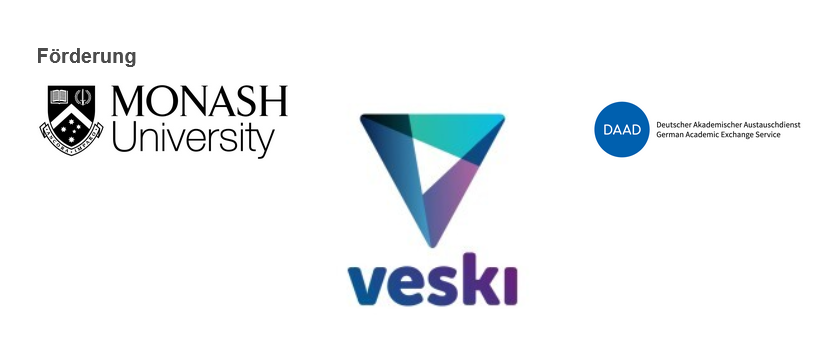
Project leader(s): Prof. Dr. Ruth Müller
Period: 01.04.2022-31.03.2025
Funding institution: Institute for Advanced Study
Themes: Science Communication, AI, expectations, sociotechnical imaginaries
People (working on the project at the STS Department): Prof. Dr. Ruth Müller, Dr. Aysel Sultan
The Research Cultures in Germany project investigated how researchers in various fields and disciplines perceive working and living in Germany and what opportunities and challenges they identify for local research cultures in Germany. The aim was to develop a description of the current conditions from which the Foundation could derive ideas for its funding activities and for potential improvements for the future of research cultures in Germany.
Within the context of this project, we understand research cultures as multidimensional: they are composed of epistemic, social, organizational, and societal dimensions. We therefore also speak of research cultures in the plural: while there are frameworks at the societal and organizational level that apply to all research fields in Germany. Moreover, specific research fields have their own epistemic and social practices and norms against which they interpret and negotiate organizational and societal frameworks.
In Germany, working and living conditions with regards to research careers have gained attention in recent years, especially along the protest movements from untenured staff and early career researchers that became a popular debate under the #IchbinHanna and #IchbinReyhan (Bahr et al., 2022). This movement has pointed to precarious employment conditions and accompanying restrictions to quality, creativity, productivity, and also diversity in German research landscape. These protest movements, the evaluation of the Wissenschaftszeitvertragsgesetz 2022, or attempts by some universities to establish new forms of employment, especially for postdoctoral researchers, have led to an intensive discussion of the situation of untenured staff. What is largely missing, however, are debates and analyses that take a systemic perspective and, in this sense, look at research cultures in Germany from the perspective of different actors and their interactions. This project aimed to emphasize some of the field-specific differences in sociology, environmental humanities, artificial intelligence and synthetic biology to highlight the interrelation of different human and nonhuman actors (such as institutional structures, legal conditions) in navigating the challenges of everyday research life.
Our findings suggest that some problem areas can be addressed directly through changes in research funding. In many cases, we see the Volkswagen Foundation as an actor that could initiate important discourses in the German science system and thus achieve step-by-step changes together with other actors.
Partner
Joanneum Research Forschungsgesellschaft mbH
DHZW (German Centre for Higher Education Research and Science Studies)
EvaConsult
Project leader(s): Michael Ploder, Joanneum Research, Graz/Austria
Period: Jan-Dec 2022
Project type: Consortium Project Third-party funded Project
Funding institution: Volkswagen Foundation
Project leader(s): Univ.-Prof. Dr. Sascha Dickel, Prof. Dr. Karin Zachmann, Dr. Olga Sparschuh
Period: 2017-2023
Funding institution: DFG – Deutsche Forschungsgemeinschaft
Themes: Evidence Practices in Science, Medicine, Technology and Society
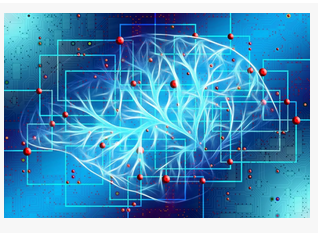
As part of the TUM Innovation Network for Neurotechnology in Mental Health (NEUROTECH), we follow an innovative embedded ethics and social science approach that we recently developed in a collaborative effort and have started to implement at TUM. This approach is based on the interdisciplinary integration of ethics and social science researchers into the basic science, clinical and technology development aspects of the research processes of neurotechnology. Based on this integration, we accompany and analyze the research and development processes of the NEUROTECH network, for example when building novel AI-driven therapeutic interventions. We then feed back our analysis of potential ethical and social issues – ranging, e.g., from algorithmic bias to data protection aspects to impacts on patient autonomy and the future doctor-patient-relationship – into development processes in real-time in order to identify, reflect on and address any ethical and social issues as they arise.
To complement this analysis, we work in participatory ways with relevant stakeholders in society that are affected by the technology and its implementation, such as patients and patient organizations, doctors and nursing staff. We engage with these stakeholders, explore their perspectives and expertises and make this knowledge available to the NEUROTECH network so that it can be considered in research processes and the development of technologies as well as their clinical implementation
Partner
Prof. Dr. Simon Jacob (Translational Neurotechnology) – Coordinator
Prof. Dr. Alena Buyx (Ethics in Medicine and Health Technologies)
Prof. Dr. Julijana Gjorgjieva (Computational Neurosciences)
Prof. Dr. Ruth Müller (Science & Technology Policy)
Prof. Dr. Markus Ploner (Human Pain Research)
Prof. Dr. Josef Priller (Department of Psychiatry and Psychotherapy)
Prof. Dr. Daniel Rückert (Artificial Intelligence in Healthcare and Medicine)
Prof. Dr. Bernhard Wolfrum (Neuroelectronics)
Project leader(s): Prof. Dr. Simon Jacob (Coordinator); Prof. Dr. Ruth Müller (PI “Embedded ethics and social science for responsible neurotechnology”); Prof. Dr. Alena Buyx (Co-PI “Embedded ethics and social science for responsible neurotechnology”)
Period: 2022-2026
Project type: TUM Innovation Networks
Funding institution: TUM Innovation Networks
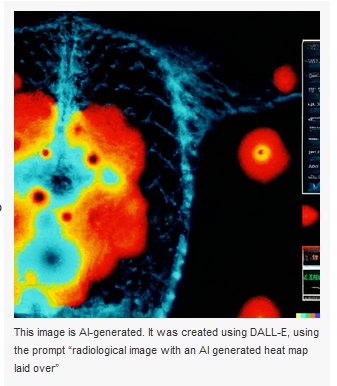
People (working on the project at the STS Department): Prof. Dr. Ruth Müller, Prof. Dr. Alena Buyx, Svenja Breuer, Theresa Willem.
As artificial intelligence (AI) and Machine Learning (ML) continue to advance and permeate healthcare and medicine, it is crucial that we consider the ethical and social implications of these developments. From issues of bias and discrimination, privacy and autonomy, transparency and accountability, to questions of human-machine interaction, the ethical and social issues surrounding medical AI are complex and multifaceted and need to be addressed carefully and responsibly.
MedAIcine addresses key challenges and tensions regarding the responsible design and use of AI in medical imaging. Applying an embedded ethics and social science approach, the project team of science and technology studies (STS), philosophy, and ethics researchers investigates social and ethical aspects emerging in medical AI research and implementation empirically. We conduct case studies of ML in radiology, dermatology, and endoscopy, using a process of long-term integrated collaboration with technological and medical researchers and practitioners. Our research foci include issues of trust, privacy, transparency, explainability, and responsibility in relation to medical AI technologies, physician and patient perceptions of these technologies, and issues of bias and equity in data collection and analysis.
MedAIcine is the first pilot project of the Center for Responsible AI Technologies, founded by the University of Augsburg (UNIA), the Munich School of Philosophy (HFPH) and the Technical University of Munich (TUM) in February 2022. The Center pursues the goal of bringing consideration of philosophical, ethical, and social science questions and problems into the entire process of AI technology development and implementation.
Projektleitung: Prof. Dr. Ruth Müller, Prof. Dr. Alena Buyx
Zeitraum: 10/2022-09/2025
Projekttyp: Third-party funded Project
Fördergeber: Center for Responsible AI Technologies
Subproject 8 focuses on evidence practices in the evaluation of scientific quality for research funding purposes. In the contemporary scientific system, high scientific quality – often framed as excellence – has become both a key goal of scientific and political activities and the center of many controversies How, for example, can excellence be defined, measured, compared and made evident?
In phase 1 of the research unit, the associated project AP2 studied how reviewers for the European Research Council (ERC) perceive and navigate scientific evaluation process at the ERC and which norms and values guide their evidence practices and decision-making processes. AP2 showed a significant tension between reviewers, on the one hand, promoting a vision of excellence as a deeply heterogenous and context-dependent quality of scientific work when they discussed excellence in the abstract during the interview. On the other hand, they recounted a focus on standardized performance indicators when they described how they actually evaluated proposals and CVs during the ERC assessment process.
In the subproject TP8 for phase 2 of the research unit, we are now shifting our focus of study to the evidence practices scientists engage in when they prepare applications for the ERC. We will conduct this analysis against the backdrop of broader dynamics and transformations in contemporary science that lead to processes which de- and restabilize notions of scientific quality – processes, for which the creation of the ERC itself is indicative.
Reviewers and applicants alike need to face the challenge of how to make the quality of research ideas and scientific biographies evident. Subproject 8 will analyze which practices researchers engage in when they attempt to generate evidence for the excellence of their proposals and CVs for review at the ERC. It will further explore which epistemic, normative and institutional implications these practices might have. The project will answer these questions by means of qualitive social science inquiry. We will conduct interviews with researchers and with university personnel who aim to support their application processes; analyze application documents; and conduct participatory observations at coaching events for ERC applicants. The subproject will thus study how researchers generate evidence for the quality of their work and their scholarly biographies and thereby create and rehearse new criteria and standards for what counts as high-quality and thus credible science. Given the central role that scientific knowledge plays in evidence practices in a range of social arenas, we believe that such a reflexive analysis of evidence practices in science, which crucially regulate the distribution of resources and academic esteem, is an important element of the unit’s research program.
Project leader(s): Prof. Dr. Ruth Müller
Period: 12.2020 - 09.2023
Project type: Drittmittelprojekt / Third-party funded Project
Funding institution: DFG
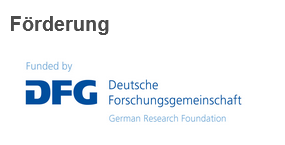
The integration of embodied Artificial Intelligence (AI) into healthcare and society is expected to deliver major benefits in future decades. However, innovations such as AI operating robots, AI prosthetics, care- or at some point even micro- and nanorobots will come with a number of ethical, social, political and legal challenges, among them ground-breaking shifts in the work cultures and expertise of medical professionals. These challenges arising from novel divisions of labour between humans and machines need to be addressed proactively if embodied AI is to be implemented into medicine and society successfully and responsibly. While overarching principles such as those by the European High Level Expert Group on Artificial Intelligence, or standards such as the ISO for personal care robots have been developed, concrete and fine-grained frameworks for a responsible integration of embodied AI products into healthcare practices and work cultures are still largely missing. There are also no best practice models available for the interdisciplinary development of human-machine applications in biomedicine that take ethical, social and regulatory issues into account.
RR-AI therefore seeks to 1) empirically study the social and ethical and legal dimensions of two novel AI-based technologies – a service robot named GARMI, and a smart arm exoprosthesis – as they are being developed and implemented in healthcare practice; 2) develop a practical toolbox for future interdisciplinary AI innovation, as well as concrete standards and recommendations for responsible integration of embodied AI into healthcare work practice and training; 3) experimentally test these tools and recommendations through interdisciplinary co-creation and work-place integration of embodied AI applications. The project thus takes an innovative “embedded” approach, whereby ethical, social, legal and political analyses constitute integral elements of an AI product design process as well as its work place integration. Project results will be discussed with stakeholders, pilot-tested and disseminated widely.
The project is part of the transdisciplinary consortium “Digitalization” (https://www.bidt.digital/bidt-foerdert-neun-forschungsprojekte-zur-digitalisierung/), which explores questions of the digital transition in economy and work, politics and society, as well as media and public communication. The consortium is funded by the Bavarian Institute for Digital Transformation (bidt) of the Bavarian Academy of Sciences and Humanities. Within the consortium, the project “Responsible Robotics” is part of the initiative “economy and work”.
Project leader(s): Prof. Dr. Ruth Müller
Period: 04.2020 - 06.2023
Projekttyp: Verbundprojekt
Funding institution: Bayerisches Forschungsinstitut für digitale Transformation (bidt)
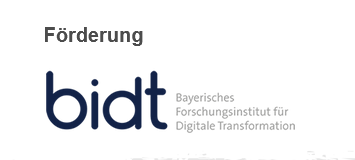
- PI: Prof. Dr. Ruth Müller
- Researcher: Julia Feiler
In science and in society, the CRISPR-Cas9 system is currently discussed as revolutionary new genetic technology. The novel technique promises more precise and cost-efficient ways of genetically “editing” the genomes of a wide variety of species. Potential applications range from the drastically simplified production of genetically modified crops and livestock to the development of new gene therapies. In the agricultural sector, the new technical possibilities have raised hope that they will enable more resource-efficient and sustainable forms of agriculture as they could complement existing traditional breeding techniques. At the same time, the possibility of gene editing raises a range of ethical, political and social concerns and has stirred up debates about if, how and when these new technologies should be used.
As part of the transdisciplinary research consortium FORTiGe, which is funded by the Bavarian research association: forschungsstiftung.de/Projekte/Details/Forschungsverbund-Tiergesundheit-durch-Genomik-FORTiGe.html) we examine public and scientific perceptions and imaginaries of gene editing technologies. We focus particularly on potential applications of gene editing for livestock breeding in the specific Bavarian context. Using qualitative social science research methods such as interviews and scenario-based focus group discussions, we examine how different stakeholders, including farmers and breeders, perceive the opportunities and challenges of gene editing. We thereby facilitate inclusive deliberation about what the responsible development of gene editing technologies could look like in the specific national and local context of Bavaria.
Project leader(s): Prof. Dr. Ruth Müller
Period: 09.2018 – 05.2021
Project type: ["Verbundprojekt \/ Consortium Project"]
Funding institution: Bayerische Forschungsstiftung
- PI: Prof. Dr. Ruth Müller
- Researcher: Dr. Sarah Schönbauer
Plastics and specifically microplastics in the environment are increasingly receiving public attention. Headlines such as “Dangerous mini-poison-bomb” (Focus online, 2012) or “Underestimated Danger – Plastic particles contaminate food” (Spiegel online, 2013) point to an increasing public discourse about microplastics as a potential environmental and health risk. Increasing public attention is going hand in hand with a surge in scientific and political engagement with the topic.
The project “Plastics – Publics – Politics” analyses how different stakeholders perceive and understand microplastics and how it is discussed and rendered potentially problematic in different social arenas, such as the media, civil society, science or policy. Thereby, the project generates a better understanding of the societal contexts in which current efforts to change the use and governance of plastics unfold.
The study employs qualitative social science methods, such as a media analysis of the representation of microplastics in daily and weekly German newspapers, interviews with scientists and citizen activists, and focus groups with citizens. Furthermore, the project fosters inter- and transdisciplinary dialogue between stakeholders from science, politics, civil society and industry, for which the project team collaborates with the German Federal Environment Office.
The project is part of the transdisciplinary consortium “SubµTrack: Tracking of (Sub)Microplastics of different identities” (https://www.wasser.tum.de/submuetrack/startseite/), which explores the toxicological, ecological as well as the social and political aspects of micro and nano plastic particles in the environment,. The consortium is funded by the German Federal Ministry of Education and Research (BMBF) as part of a BMBF-funded initiative “Plastic in the Environment“ (https://bmbf-plastik.de/en). The project “Plastics – Publics – Politics” receives additional funds from the MCTS Lab “Engineering Responsibility”.
Project leader(s): Prof. Dr. Ruth Müller
Period: 03.2018 – 08.2021
Project type: ["consortium"]
Funding institution: BMBF
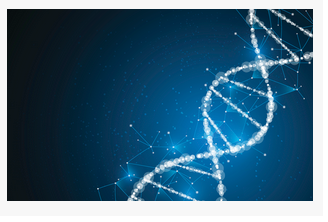
Project team: Prof. Dr. Ruth Müller (PI), Dr. Michael Penkler, Sophia Rossmann, M.A., Georgia Samaras, M.A.
Epigenetics explores changes in gene expression that do not result from gene mutation, but from chemical modifications on the DNA. In recent years, such epigenetic modifications have been found to respond to numerous stimuli from the environment – such as toxins, nutrition, trauma or stress – giving rise to the field of ‘environmental epigenetics’. By proposing mechanisms for how such factors can alter gene expression, environmental epigenetics offers important novel perspectives for understanding body, health and illness as ‘biosocial’. However, it is yet unclear what the specific impact of such perspectives might be in different research areas within the life sciences and how approaches from environmental epigenetics might affect understandings of body, health and illness differently in different fields.
This project thus takes a comparative approach and studies how approaches from environmental epigenetics are adopted and adapted in three research fields of great relevance for public health: nutritional epidemiology, environmental toxicology, and the pathophysiology of mood & anxiety. To this end, the project team uses qualitative social science research methods such as interviews, ethnographic observation and document analysis. By taking this comparative approach the project design gives room to the possibility that environmental epigenetics might constitute different “epistemic things” (Rheinberger, 1997) in different research contexts with different social and political implications. This approach builds on insights from Science & Technology Studies that emphasize the situated character of knowledge production (Haraway, 1988; Knorr-Cetina, 1999) and the need for context-sensitive research approaches (Jasanoff, 2004). Beyond contributing to social science debates the project will actively promote constructive interdisciplinary dialogue between social and life sciences.
Project leader(s): Prof. Dr. Ruth Müller
Period:10.2018 – 09.2021
Project type: ["Drittmittelprojekt \/ Third-party funded Project"]
Funding institution: DFG
Evidence is continually growing in importance for political, societal, and individual decisions, despite increasing talk of an impending ‘post-factual era’. Evidence is based on data that is collected in a scientific fashion, but is also a social phenomenon. How and by whom is it created and used, and what impact does this have? These are the main questions that our Research Group has set out to investigate. Since evidence is an issue that concern many different scientific disciplines, our group is interdisciplinary in outlook. Our six sub-projects include scholars from the subject areas History of Technology, Sociology of Science/MCTS, History and Ethics of Medicine, Marketing and Consumer Research, as well as History of Science and Technology.
- Speaker: Prof. Dr. Karin Zachmann (until 2024), Prof. Dr. Ruth Müller (from 2024)
- Co-Speaker: Jun.-Prof. Dr. Sascha Dickel (Sociology of Science, University of Mainz)
- Coordinator: Dr. Olga Sparschuh
Subprojects
subProject 4: The Role of Moralization in the Interpretation and Use of Nutritional Evidence
2020 – 2023
This project examines the evidence practices of consumers in the field of nutrition. Nutrition is an evolutionary and culturally engrained practice that has only recently – approximately the last hundred years – been strengthened, confronted or changed by findings from the nutritional sciences. The results of the first research phase show that evidence – understood as meaningful and socially accepted knowledge and guiding consumer action – is not only based on scientific knowledge, but is influenced by heuristics and values. This is especially the case when scientific knowledge is fragile and in conflict with intuitive judgments of right or wrong and good or bad.
- Prof. Dr. Jutta Roosen
- Edoardo Maria Pelli
subproject 5: The Risk Industry. Evidence for safety as a new field of research and enterprise (1960s to 1980s)
08.2020 – 08.2023
This project investigates changing evidence practices for technical safety in Germany during a key period from the 1950s to the 1980s. Whereas the first project phase focused mainly on the two technological domains of nuclear and automotive technology, the second phase will concentrate on the emergence of what we call the risk industry. We use this term to describe the new field of academic as well as commercial activity arising since the late 1960s, which used the concept of risk as a central category in order to produce and apply knowledge on and evidence for (technical) safety – in an engineering, political-discursive, as well as entrepreneurial sense. The project aims to describe the historical development of this new field of knowledge in the Federal Republic of Germany (FRG) and to analyze its role in the establishment of a new evidence regime for technical safety since the 1970s.
- Prof. Dr. Karin Zachmann
- Dr. Stefan Esselborn
Subproject 8: Obviously Excellent? Evidence practices in preparing scientific research and biographies when applying for ERC starting and consolidator grants
In the contemporary scientific system, high scientific quality – often framed as excellence – has become both a key goal of scientific and political activities and the center of many controversies How, for example, can excellence be defined, measured, compared and made evident? Subproject 8 focuses on evidence practices in the evaluation of scientific quality for research funding purposes
- Prof. Dr. Ruth Müller
- Dr. Mallory James
Project leader(s): Prof. Dr. Karin Zachmann
Period: 13.12.2016 – 30.09.2023
Project type: Verbundprojekt / Consortium Project
Funding institution: DFG



Co-creation—the practice of bringing together diverse actors in a joint innovation activity to mutual benefit— has emerged as a widely desired key resource in current attempts to enhance innovation processes and outcomes. The European Research Consortium SCALINGS explores the avenues and limits for the wider dissemination and use of co-creation practices across Europe.
Through a multi-sited, embedded, and comparative experimental research design, SCALINGS studies the unique implementations and outcomes of three co-creation instruments: innovation procurement, living labs, and co-creation facilities. The consortium focuses on two technology domains (robotics and urban energy systems) across 10 partner countries. SCALINGS aims to strengthen opportunities for best practice transfer and a socially robust upscaling of co-creation, while improving our understanding of how co-creation practices relate to the social, cultural, economic, and institutional environments in which they are implemented. SCALINGS is an interdisciplinary project that brings together social scientists, engineers, policy-makers, and industry partners from all over Europe.
The project SCALINGS is funded by the European Union’s Horizon 2020 research and innovation programme within the specific objective Science with and for Society of Horizon 2020. This objective is to build effective cooperation between science and society, to recruit new talent for science and to pair scientific excellence with social awareness and responsibility.
Partner
- TUM (DE) – Technical University of Munich
- TU/e (NL) – Eindhoven University of Technology
- DTU (DK) – Technical University of Denmark
- EPFL (CH) – École Polytechnique Fédérale de Lausanne
- ARMINES/MINES ParisTech (FR) – Association pour la Recherche et le Développement des Méthodes et Processus Industriels / École Nationale Supérieure des Mines de Paris
- ESADE (ES) – Fundación ESADE
- BOKU (AT) – Universität für Bodenkultur Wien
- UEW (PL) – Wrocław University of Economics
- UCL (UK) – University College London
- SIX (UK) – Social Innovation Exchange Ltd
Project leader(s): Prof. Sebastian Pfotenhauer
Period: 09.2018 – 09.2021
Project type: ["consortium"]
Funding institution: Horizon 2020
Sola dosis facit venenum – »Alle Dinge sind Gift, und nichts ist ohne Gift; allein die Dosis machts, daß ein Ding kein Gift sei.« (Paracelsus 1538, Begründer der Toxikologie)
The longstanding dogma of toxicology »the dose makes the poison« has been subject to renegotiation in recent years, triggered by new insights from the molecular biological field of epigenetics. Epigenetics investigates how small chemical modifications upon the DNA (epi-, Greek: »upon«) can have a lasting effect on gene expression without being caused by genetic mutations. Novel research findings show that such epigenetic modifications have been found to change in response to environmental stimuli – such as toxins, nutrition or stress – giving rise to research approaches summarized as environmental epigenetics.
For the field of environmental toxicology, acknowledging the role of the environment in disease development via epigenetic mechanisms is something very appealing. Studies in this field investigate the harmful effects of environmental toxins, such as plasticisers or metals, on organisms. However, scientists have been puzzled for decades by the mechanism behind the long-term health effects of toxins that could not be explained by mutations. To answer this longstanding question, research in the field is currently highly invested in unravelling the basic mechanism by which toxins affect epigenetic processes in the body and how these changes can cause later life diseases.
In my dissertation project, I would like to address the following research question: what does the approach of environmental epigenetics make in-/visible in environmental toxicology and with what consequences? I am particularly interested in the shift of environmental toxicology towards adopting and adapting epigenetic approaches to their research agendas. I see this shift embedded in the ongoing process of the molecularization of the life sciences since the 1990s, drawing special attention to the fields of toxicology and environmental epidemiology. The fields current efforts to trace the long-term effects of toxic exposure back to the materiality of the molecular reflects this reorganization of the field towards a »molecular ‘style of thought’« (Fleck, 1979; Rose, 2007).
I want to illustrate this shift by focusing on the object of toxicity. How does toxicity come into being as a »recognizable object« (Murphy 2006) via contingent moments in the history of toxicology and environmental epidemiology? In what ways changes the object of toxicity in relation to the transformation of the field from a descriptive, service-science oriented science towards a mechanistic science, adapting molecular biology tools? What novel regimes of evidence are implemented to make toxicity visible? Where can we see frictions towards the classical toxicology and epidemiology? Drawing on literature analysis, qualitative interviews and participant observation, I ask myself how researchers think as well as do toxicity in their specific research contexts leading me ultimately to the questions of how toxicity is »made to matter« (Murphy 2006) in environmental epigenetic research on toxins and with what consequences for the perception of health and disease.
The PhD project is embedded in the project “Situating Environmental Epigenetics. A Comparative, Actor-Centered Study of Environmental Epigenetics as an Emergent Research Approach in Three Research Fields”, funded by the by the German Research Foundation and led by Prof. Ruth Müller.
Project leader(s): Sophia Rossmann
Period: Since 2018
Project type: ["phd"]
Are obesity and related metabolic disorders the result of a lack of self-discipline? This socially and medically widespread assumption is being challenged by medical research findings about the developmental origins of health and disease. For example, gestation and the first years of life are increasingly seen as formative for later-life disease risks. Experiences like over- or under-nutrition can condition the body in ways that increase or decrease one’s chances to develop obesity and metabolic disease in adulthood. In addition, some research findings even suggest that such ‘programming effects’ might not only influence one’s own health, but possibly also the health of one’s offspring. Disease risk might thus be inheritable across generations. Such findings have the potential to change how we think about and treat obesity and metabolic disease in health policy, medical practice, and everyday life. They highlight, for example, the significance of maternal nutrition for the future health of the unborn child – an assertion that can put parents under considerable pressure. The assumption that obesity and metabolic disease have developmental origins in early life can also lead to a closer examination of widespread stereotypes about obese people being ‘lazy’ or ‘unable to control themselves.’
In the social science research project “Articulating metabolic disease in a life course perspective,” I investigate how scientists study the developmental origins of metabolic health and disease in order to trace the social and political implications of this biomedical research field. I am observing the research practices of leading researchers in the field, conduct interviews and analyze current scientific publications in this area. I empirically investigate how different research approaches redefine obesity and its co-morbidities as life course diseases, and how this potentially changes notions of who is individually and collectively responsible for leading a healthy life. The research project thus aims to trace novel medical models of metabolic health and disease while they are still emerging in order to reflexively explore their wider implications and the possible challenges they might pose for society.
The project has been awarded an Erwin Schrödinger Fellowship of the FWF Austrian Research Fund.
Project leader(s): Dr. Michael Penkler
Period: 09.2018 – 09.2021
Project type: Array
During the last two decades, we can observe a change in how the life sciences conceptualise life: no longer mainly based on an unchangeable genome, but increasingly as affected by the way we live. Environmental epigenetics is an emerging research approach within this perspective and proposes that human bodies and minds are malleable, able to adapt to socio-material environments, among them toxins, nutrition, and stressful experiences. These adaptions, researchers suggest, take place via molecular processes, altering the way our genes are transcribed and therefore the way how our bodies and health develop. While environmental epigenetics offers important novel insights for understanding human life as a biosocial phenomenon, it also extends the biological gaze from the laboratory towards suitable objects of study out in the real world – an extension that possibly implies social and political consequences for individual and community live, as well as for scientific research practices.
This thesis therefore studies how a psychiatric research institute uses approaches from environmental epigenetics to better understand the causes for and development of mental health conditions. Within epigenetic research in psychiatry, stressful experiences are described as a crucial “epigenetic environment” which gives rise to research strategies attempting to re-enact stress in the laboratory setting. In my thesis, I provide in-depth insights into these everyday research practices based on ethnographic fieldwork, qualitative interviews, and literature analysis. I specifically investigate re-enactments of stress in three different experimental arrangements: cell models, animal models, and research with human material. Given this context, I argue that these different experimental arrangements enable equally different epigenetic accounts of mental health with diverse social implications.
In addition to the analysis of how researchers operate with environment/stress in their experiments, the work also looks at the environment of these research practices and the biological laboratory. Given this perspective, I demonstrate a divergence between the scientists’ ideal imaginations about conducting neat stress research and the actual research conditions. That is to say, that environment in epigenetics not only matters as a stimulus in stress experiments, but also as a real-world phenomenon that influences research practices, such as a noisy construction site, that might have effects on behavioural experiments with mice.
Given the central hypothesis of environmental epigenetic research – namely that environmental experiences are reflected in our biology, even down to the cell nucleus – my work provides important insights into how epigenetic perspectives are not only integrated into psychiatric research, but also how environmental epigenetics itself might change biological research. In other words, this thesis shows how epigenetics holds the potential to change the epistemology of the life sciences and our social science understanding of the biological laboratory.
Project leader(s): Georgia Samaras
Period: 2015-2020
Project type: ["phd"]
Project Team: Prof. Dr. Ruth Müller (PI), Dr. Lucas Brunet, Kay Felder (previously)
Academic excellence has become a key notion within science policy discourses in recent years. Many profound reforms in the European academic research landscape have been argued as necessary in order to improve the scientific excellence of different research systems. At the same time, the concrete meaning of the term “excellence” often remains opaque and only becomes tangible in the situated contexts of its use. In this project, we investigate how the notion of excellence is operationalized at an important site of academic evaluation and selection, that is in European funding programs for early- and mid-career researchers. The project takes an actor-centered approach and uses reflexive peer-to-peer interviews to explore the reviewers’ perceptions and understandings of scientific excellence in different research funding contexts.To this end, the project draws on concepts and methods from both Science & Technology Studies (STS) and Valuation Studies, which understand notions of value and worth as products of complex social processes and negotiations, not as prefigured categories that can readily be applied in a social situation. Consequently, we understand peer reviewers as actors that make complex decisions about the value of research and researchers against the backdrop of an ever-changing scientific system within which they have to navigate potentially conflicting ideas about what counts as excellent science. Through its exploration of reviewers’ perceptions of excellence, the project aims to contribute to an empirically grounded discussion in science and in science policy about the norms, values, and potential tensions that characterize evaluation processes for research funding in the context of an increasingly competitive research system.
The project is supported by the STS Lab Engineering Responsibility and the TUM Gender & Diversity Incentive Fund. Furthermore, the project is associated with the DFG research group 2448 “Practicing Evidence – Evidencing Practice”.
Project leader(s): Prof. Dr. Ruth Müller
Project type: Array
Funding institution: STS Labor Engineering Responsibility, TUM Gender & Diversity Incentive Fund
